BLM on the right side of history
On the 7th June 2020, during the worldwide BLM protests, my fellow Bristolians (Bristol being where I live) toppled the bronze statue of Edward Colston (a slave trader).
Bristol protesters topple Edward Colston statue: https://youtu.be/04NXGb1pA6g
This week a British jury has confirmed the toppling of Edwards Colston’s statue was not a criminal act, when they cleared the four BLM protesters of all charges for toppling of Edward Colston statue in Bristol.
In the closing statements following the nine-day trial, the defence had urged jurors to “be on the right side of history”, saying the statue, which stood over the city for 125 years, was so indecent and potentially abusive that it constituted a crime (hate crime).
https://www.theguardian.com/uk-news/202 … on-statute
Bristol BLM protesters overjoyed after being cleared over toppling of Edward Colston statue: https://youtu.be/D9PFao0q5ncArthur, i am on the side of this conservative RP Scott Benton. This was simply destruction of public property, no matter if you agree or not with what this guy stood for in history.
It would have been a different situation if city parliament had voted and decided to remove the statue.
This kind of thinking is dangerous and can go very far. Imho this is close to burning books by a mob.
In G. we have a sweet treat that used to be called Negerkuss (negro kiss)
https://en.wikipedia.org/wiki/Chocolate … low_treats
Nobody did much ado about the name until in recent years the name was supposed to be racist.
The old German word for black person is "Mohr". This word is also stamped to be racist and kind of forbidden. Not so easy to do so, because then a lot of classic literature would have to be rewritten (Friedrich Schiller, f.e., famous German poet with revolutionary attitude), or many child books.
Last month we had a discussion in our city about renaming an innocent street with the name "Mohr Straße". The street was named after a farmer whose name was "Mohr", luckily this insanity was dismissed.
We have this delicious gypsy sauce: https://en.wikipedia.org/wiki/%C3%80_la … ypsy_sauce
Again, same discussion about racist naming.
And a recent discussion with my Dutch friends about different Christmas habits: They have the "Zwarte Piet" in the Netherlands. https://en.wikipedia.org/wiki/Zwarte_Piet
My friends told me with a smile that "Black Pete" was getting whiter and whiter every year.
Cancelling of historic sites, of words is the wrong response to a rightful matter, me think. And tearing down a public statue is a criminal act.I found your various links interesting and educational; and we have had similar situations in the UK, for example:-
1. Robertson's is a UK brand of marmalades and jams that was founded by James Robertson in 1864. In 1910 the Company started to use a Gollywog picture as their trademark (see image below), but because it was considered racist they ceased using the image in 2002.
2. The Black and White Minstrel Show was a British light entertainment show that ran for twenty years on BBC prime-time television from 1958. But primarily because of accusations of racism the show was finally cancelled in 1978.
Your Kegerkuss sweet treat isn’t unlike our teacake. A teacake in Britain being a soft marshmallow on a biscuit base fully coated in real milk chocolate. https://www.tunnock.co.uk/products/teacakes/
However, to confuse matters, a teacake in England is also a light yeast-based sweet bun containing dried fruit, typically served toasted and buttered. https://en.wikipedia.org/wiki/Teacake
The above link is an example where Wikipedia can sometime be a bit misleading e.g. they refer to the marshmallow type under Scotland, whereas it's common throughout Britain.
If you go to a café in Britain and see a teacake on the menu it will be the latter type e.g. yeast-based sweet bun containing dried fruit; but if you go to a local food shop and ask for teacakes (and don’t specify which type) the shop assistant will more likely give you the sweet treat marshmallow on biscuit covered in chocolate type.
As regards the legality of the destruction of the statue - yes it is illegal (criminal damage), that was never in question; so it did come as a surprise that the jury found the defendants innocent, because in the eye of the law a crime was committed.
However, for years Bristolians had been petitioning the Local Government (Bristol City Council) to remove the statue, and although the Local Government is Labour (Socialist) and had sympathy with the demands, the Local Government made no effort to comply with the wishes of its citizens on this matter. Therefore, during the worldwide BLM’s protests the Bristolians took the law into their own hands and removed it themselves – hence the court case.
Shortly after the statue had been vandalised a local ‘public opinion poll’ of Bristolians showed that 66% of Bristolians agreed with the protesters actions (including myself and my family), and 66% of Bristolians felt that the protesters should NOT be prosecuted for their actions (including myself and my family): Such is the strength of feeling in Bristol about the statue.
Therefore, I guess that considering all twelve jurors will have been Bristolian themselves (and thus having an inherent distaste for Edward Colston) the jury would automatically be biased in favour of the protestors on this matter!
As an epitaph to the toppling of Edward Colston’s statue on the city centre on the 7th June 2020; on the 15 June 2020 (a week later) Colston Hall (also on the city centre) had its name removed from the building by the Authorities – and on the 23rd September was renamed ‘Bristol Beacon’.
Since the toppling of the statue, the Bristol City Local Government have retrieved the statue from the docks and relocated it to the Bristol Museum, where a balanced story of Edward Colston can be told e.g. the good deeds that he did for Bristol with his blood money such as building hospitals, schools, and Alms Houses for the poor in Bristol etc., alongside his major role in the slave trade from which he earnt his blood money.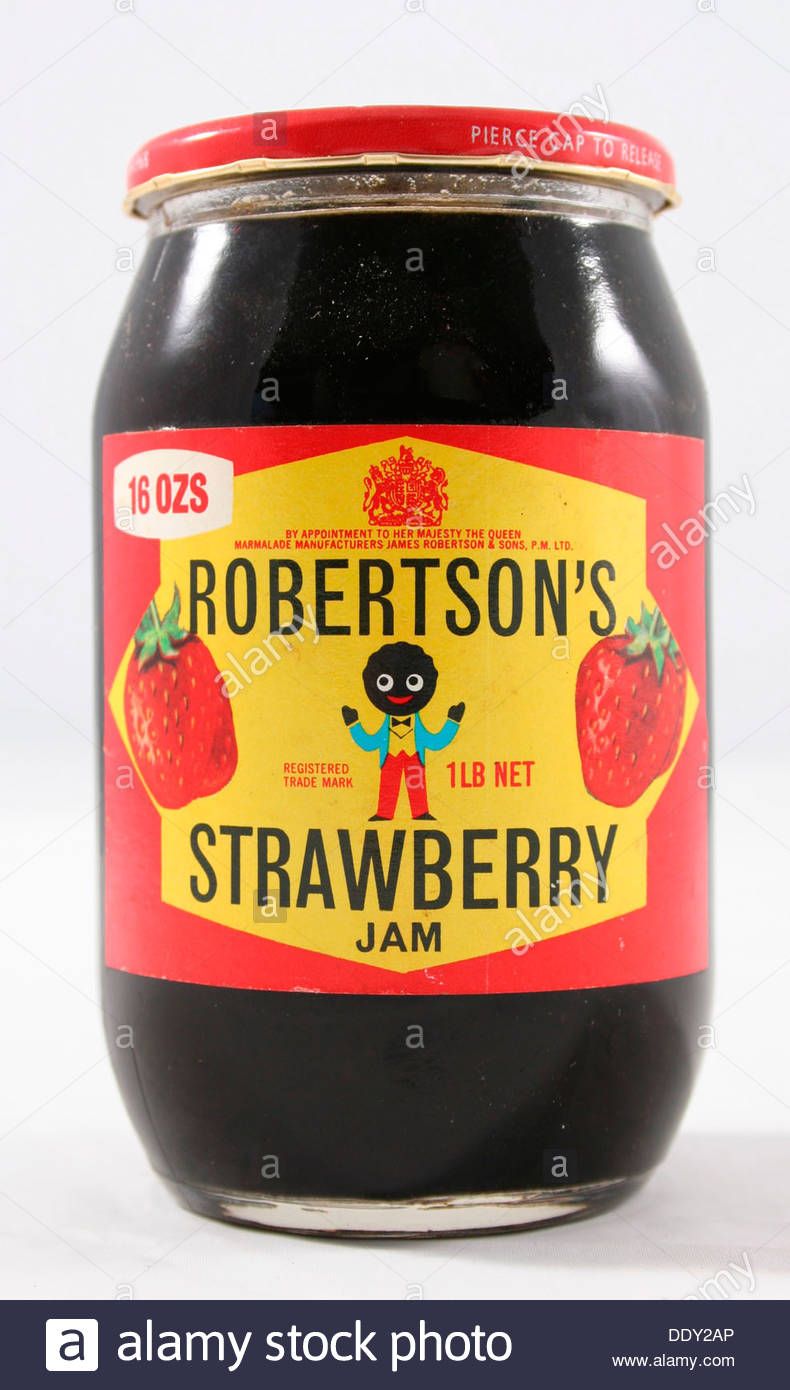
Your rationalization prompted so many knee-jerk thoughts that I hesitate to stand behind any of them, but . . .
They all seem to boil down to one conclusion; you are okay with lawbreaking and the destruction of public property because you agree with the movement.
That is a dangerous `slippery slope' Arthur. Would you still feel as supportive if a bystander, (or a participant), had been killed or injured by that toppling statue?
I am doubtful that this action has any ties to the right side of history.
GAI wouldn’t dispute what you are saying GA, you are right in what you say; but I guess it’s the British ‘revolutionary’ (for want of a better word) side that’s coming out in me, especially being Bristolian e.g. there’s been 10 significant riots in Bristol since 1793, 6 in my lifetime; not counting the civil disobedience across the whole of Britain in 1990 when 14 million people (1/3rd of the adult population) refused to pay the poll tax that Margaret Thatcher tried to introduce – the poll tax riots and civil disobedience led to resignation of Margaret Thatcher as Prime Minister.
Yes, most British people (including Bristolians) are law-abiding citizens, and most of the time will frown upon violent protests and riots; although generally supportive of most peaceful protests. But, the British people do not like being pushed around and when push comes to shove, or when red-lines are crossed, will protest, and violently if necessary. I think it may be a bit of a European thing as protests and demonstrations (sometimes becoming violent) have always been common across Europe.
The 10 major riots in Bristol are listed below. I haven’t included the protests and demonstrations, such as the BLM demonstration in 2020, because they are too numerous to mention, and generally quite peaceful.
• 1793 – Bristol Bridge riot: Bristolians objected to tolls being introduced to cross Bristol Bridge; in the riots 11 people were killed.
• 1831 – Queen Square riots: Caused because the House of Lords refused to give all but a minority of people the vote in Bristol e.g. only 6,000 of the 104,000 had the vote; in the pursing riots that followed, and criminal damage, and fires; and estimated 500 people lost their lives. In essence Bristolians wanted Parliament to get rid of the ‘rotten boroughs’ (a political term).
• 1931 – Old Market riot: Bristolians objected to the Government in reducing unemployment benefit by 10%, the demonstrations met heavy resistance from the police who deployed mounted police on horseback and batons causing many injuries but no deaths.
• 1944 – Park Street riot: riot sparked by racial tension between USA Military Police and Black GI’s.
• 1980 – St Pauls riot: Riots sparked by racial tension between the police and black people.
• 1987 - St Pauls riot: Riots sparked by racial tension between the police and black people.
• 1992 – Harcliffe riot: Caused by the police accidently killing two suspects they were chasing, when their police car hit the two on a stolen motorbike.
• 2011 April – Stokes Croft Tesco Riot: A food store chain (Tesco) wanted to open a new chain store in Stoke Croft, Bristol. Stoke Croft is a road 2 miles long lined with ‘Independent’ shops (similar to Portobello Road in London), and the local residents objected to a chain store muscling in on a popular ‘independent’ shopping area.
• 2011 August – National Riots: Spontaneous riots sprang up across Britain when the police in London shot dead Mark Duggan.
• 2021 - Kill Bill riots: The riots in Bristol were part of national protests against the Government proposed bill to give the police more powers.
In conclusion, I don’t in principle disagree with what you say, but as a Brit I also feel that if people don’t stand up for their rights and be prepared to fight for them, then they’ll lose those rights.
Bristol Stokes Croft Anti-Tesco Riot: https://youtu.be/hkCvka1uwuo
'Kill the bill' protest in Bristol: police vans set alight - https://youtu.be/vl7zVmo_n9YI don't think `standing up' justifies property destruction? I don't see anything "revolutionary" about it. What you are saying may encompass civil disobedience or even rebellion, but neither of those demands destruction to be legitimate. Contrarily, I think destruction delegitimizes either.
GAHmm. . . If I am reading your "tea" correctly, as in the Boston party, then one of your old lines come to mind: "I thought you were better than that." ;-)
As in comparing this 21st-century incident to that 17th-century incident, thinking I approve of those fake Indians' actions. Although both included property damage, I think that is the only thing they had in common.
However, your comparison was in mind when I said what I did. Considering the context of the discussion I don't think it is a valid comparison.
GA
The analogy that crossed my mind on reading your feedback is “you can’t make an omelette without cracking eggs”.
Yep, destruction of property is never legitimate, and neither is killing during civil wars, and the distinction between a ‘freedom fighter’ and a ‘terrorist’ can become blurred, depending on which side you’re on e.g. the IRA would consider themselves freedom fighters, but the British Government considered them terrorists.
Yeah, most people, including myself, will generally agree with you; but if Governments know that people will never riot then demonstrations have ‘no teeth’, and then it can become all too easy for democratically elected governments to impose draconian powers with little resistance.
Although publically most people will say that they disapprove of violent protests, secretly a lot of Brits have a little bit of ‘Citizen Smith’ in them; which probably explains why it was such a popular BBC TV Comedy series with the British Public.
https://en.wikipedia.org/wiki/Citizen_SmithOh gawwwd Arthur. The omelet rationalization? Have you ever considered that it is never the eggs that repeat that adage?
And then, look at the "omelet" you are defending; folks were offended. That is the great governmental injustice being rebelled against—being offended. Geesh.
GA
https://www.bbc.com/news/uk-52954305 Source of article
"A slave trader's statue in Bristol has been torn down and thrown into the harbour during a second day of anti-racism protests across the UK.
It comes after largely peaceful demonstrations across the weekend saw some clashes with police.
On Sunday evening, police in central London issued a dispersal order for the City of Westminster compelling people to leave the area after skirmishes.
Boris Johnson tweeted that the protests had been "subverted by thuggery".
Thousands of protesters massed for a second day in London, as well as cities across the UK including Bristol, Manchester, Wolverhampton, Nottingham, Glasgow and Edinburgh.
Protests were generally peaceful, with aerial footage showing thousands of demonstrators flooding the roads outside the US embassy in Vauxhall, south London, before marching towards Parliament Square and Downing Street.
"But there were some disturbances, leading to 12 arrests in London - the majority for public order offenses and one for criminal damage. Eight officers were injured, police said."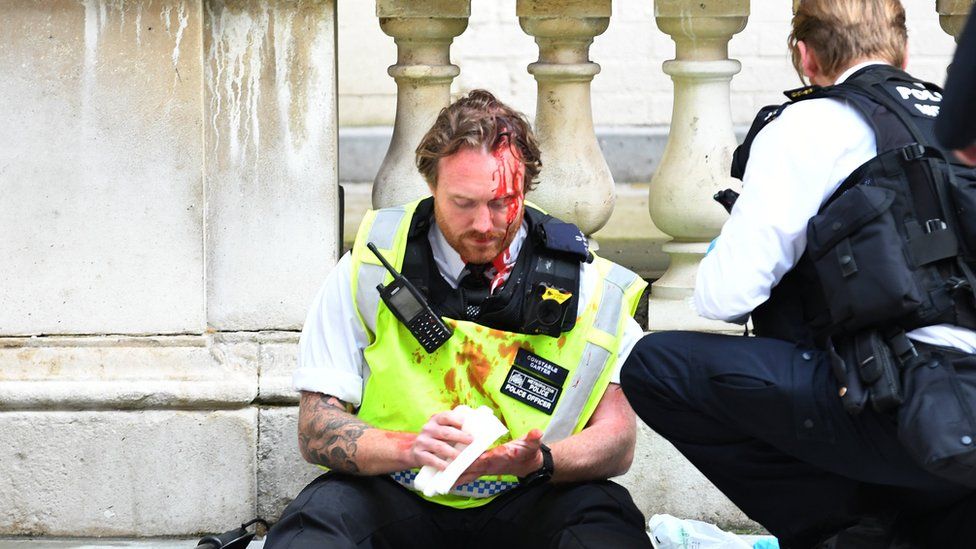
"The Metropolitan Police's Superintendent Jo Edwards said following a "predominantly peaceful protest" in the capital, officers were faced with further "scenes of violence and disorder" which were "entirely unacceptable".
At around 20:00 BST, bottles were thrown at police and there were clashes near Parliament.
The crowd shouted "no justice, no peace" as they moved down Whitehall and let off smoke bombs.
As darkness fell, lines of police in riot gear took up positions to contain a small group of protesters in Westminster, the BBC's Tom Symonds said.
A police officer received a head injury and a Section 35 dispersal order was issued until 06:00 on Monday.
The Prime Minister later tweeted: "People have a right to protest peacefully & while observing social distancing but they have no right to attack the police. These demonstrations have been subverted by thuggery - and they are a betrayal of the cause they purport to serve. Those responsible will be held to account."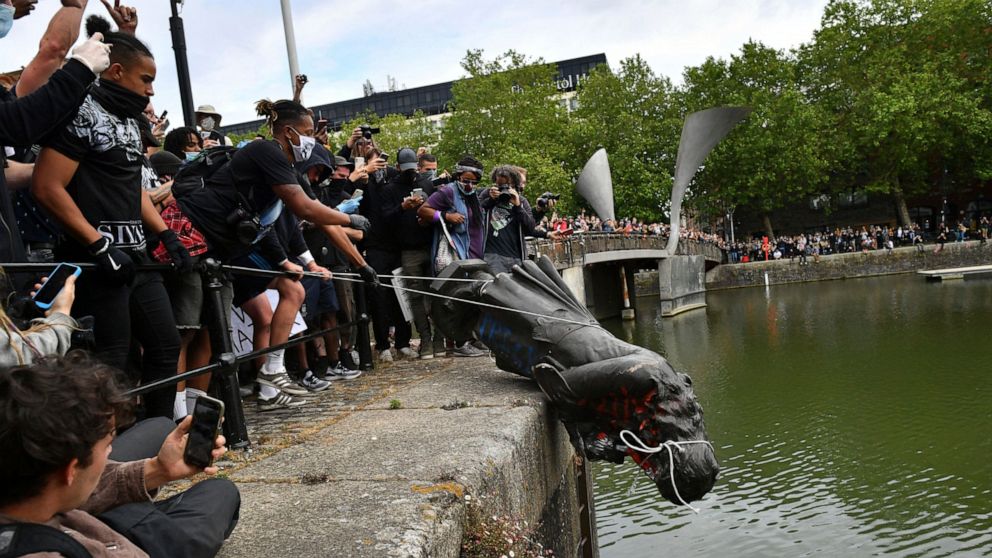
I am on the side of the law. BLM protesters have no right to destroy private or public property. They could have petitioned the court to remove the statute if the statute offered them.
I have no problem with the statue being removed if it offended. However, the people that toppled it broke the law. And it's shame the court did not punish them accordingly.
I prefer these groups be made to follow the same laws as other citizens. Of course perhaps in the UK one can destroy private property?
A society without laws can become a very dangerous society. And this would not be a part of history that IMO one could or should be proud of. However, I personally disagree with the BLM tactics. They would glean more respect for their cause by presenting themselves as a group that respects and follow set laws.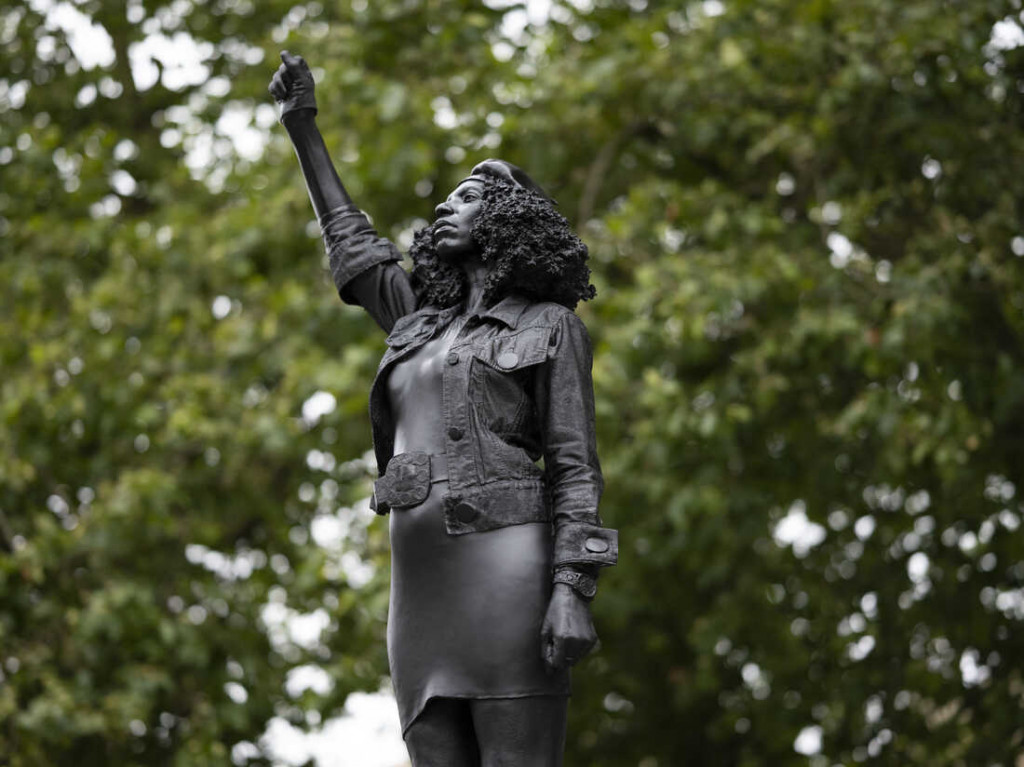
To further my point --- I dislike this statue due to the group it stands for. I feel the group promotes lawlessness, and feel they are above the law, the group promotes ideologies I don't agree with.
However, Would I get a crew and pull this statue down? No, because I respect the law. If I lived in a community where this statue was erected, and it really bothered me, I would try to have it removed by taking a legal avenue.
Just another thought --- who will bear the cost of getting the bronze statue out of the body of water, these protesters dump it. Bronze leaches lead. Bronze, alloy traditionally composed of copper and tin, and lead.
Will BLM pay for this? Guess that would be the taxpayer's problem... Hopefully, the body of water they dump the state in is not used in the city's drinking water.
Gosh, do we really need to head down a road where lawlessness is respected?Where you say: “They could have petitioned the court to remove the statute if the statute offered them.” The fact is Bristolians have for years been campaigning for the statue to be removed, but the official (peaceful) channels were getting nowhere. Therefore, the BLM protests that swept across the world in 2020 was the ‘perfect storm’ for Bristolians to take matters in their own hands and remove it themselves. If they hadn’t the statue would still be standing to this day.
Yeah, the people who toppled broke the law, and no one is disputing that; but they were judged by their fellow Bristolians on the jury, and as local opinion polls showed at the time that 66% of Bristolians were in support of the BLM protestor’s actions, it should come as no surprise that the jury would be biased in favour of the protestors: One of the facets of Trial by Jury (by your fellow peers).
Destroying property (public or private) is a criminal offence in the UK. And yeah I agree with you “A society without laws can become a very dangerous society.” And ironically one major criticism many Americans make about the UK is that there are far too many laws in the UK. USA citizens often pride themselves on the concept of ‘Freedom of Choice’.
But equally, there are times when the authority (governments) imposes laws, or uses laws, that go too far in infringing your rights; and when it does in the first instance you take the peaceful route e.g. lobbying, campaigning, peaceful demonstrations, peaceful protests, and voting at election time etc. However, there comes a time when the peaceful route doesn’t work, and the only way forward is violence, or the threat of violence.
It’s the power of violence that set the foundation and formation of our democratic political and legal system that we have today in Britain, and it was through violence that workers won their rights, and women won the vote etc.
All through history violent riots (revolutions) have toppled dictatorial regimes:-
• Across Eastern Europe in the 1990s the fall of the soviet bloc giving rise to free democratic countries e.g. Poland and Eastern Germany etc.
• English civil war, French civil war etc.
In my younger days I was a ‘Trade Union’ Activist, and proud of it; organising and participating in plenty of peaceful demonstrations and strike action; and I was 1 of the 14 million Brits (33% of the adult population in Britain) who exercised his right of ‘civil disobedience’ by refusing to pay my poll tax in 1990. I did take part in some of the poll tax demonstrations, but not any of the riots; it being the poll tax riots that caused Margaret Thatcher’s resignation as Prime Minister.
Poll Tax Riots 1990: https://youtu.be/IwAgaxbJyuk
The statue has since been removed from the docks, and after the repairs will be placed in the Bristol Museum with a written note giving a balance view; explaining the good Colston did for Bristol with his wealth (building hospitals, schools and homes for the poor etc.) and how Coleton earnt that money from trading in slaves.
The cost for the retrieval of the statue from the docks and its repair will be paid for by Bristol City Council (Local Government), which means that the Bristol people will ultimately cover the cost themselves from ‘local taxes’."In conclusion, I don’t in principle disagree with what you say, but as a Brit I also feel that if people don’t stand up for their rights and be prepared to fight for them, then they’ll lose those rights."
What rights did this statue, this inanimate object impinges upon?
Does this kind of disregard for law rip at the fabric of civil society, and promote Anarchy? Which in turn promotes the condition in which a people reject societal hierarchies, laws, and other institutions they don't care to respect?
And I must laugh, you compare a bunch of 20-year-olds tearing down a big blob of bronze to the English civil war, the French civil war.
Come on now...
Hey, if citizens wanted the statue removed, it was unlawfully removed, the jurors apparently saw no problem with the lawlessness, in fact, what it said to me is they rewarded it. Go figure.
You got yourself a new statue. EnjoyFair comment; as you say - it’s not the statue itself that impinged human rights; it’s what the statue symbolised (honouring a slave trader) that the Bristolian population found offensive.
I totally agree with you, no one wants society to degenerate into anarchism; generally the British people do respect the law and would fight to defend the British Democracy against totalitarianism or anarchism etc.
However, civil disobedience and riots don’t in themselves lead to anarchy. We’ve had six violent riots in Bristol in my lifetime (3 in the last 10 years); but once the riots are over everyone goes back to being law abiding citizens, as if nothing happened.
It’s generally only in civil war situations, like we had in Northern Ireland from 1968 to 1998 that people reject societal hierarchies, laws and other institutions they don’t care to respect; but following the 1998 peace treaty (The Good Friday Agreement) life in Northern Ireland has returned to an uneasy peace.
Yeah, 11 of the 12 Bristol jurors supported the 4 protesters in court; and as in the UK a jury’s reasoning for their decision is privy until themselves, we shall never know on what grounds the jury made their decision of ‘not guilty’. But rightly or wrongly, Bristolians are pleased with the verdict.
Actually we don’t have a new statue at this time. The black resin sculpture that depicts a black female protester, raising her arm in a Black Power salute that Bristolians erected on the plinth the day after the Slave Trader statue was toppled, was removed by the Local Government within 24 hours.
A planning application to erect the black protestor statue for two years was rejected ‘on appeal’ by the Local Government on the grounds that until the Local Government decides otherwise the plinth is reserved for the ‘slave trader’ statue? However, the Local Government this autumn just gone put the question of what should replace the ‘slave trader’ statue out to public consultation, with the intention that the Local Government will make a decision in 2022.
For the 24 hours that the black protestor statue stood, it proved popular with Bristolians, with many taking a special trip to the city centre to photograph it."However, civil disobedience and riots don’t in themselves lead to anarchy. We’ve had six violent riots in Bristol in my lifetime (3 in the last 10 years); but once the riots are over everyone goes back to being law-abiding citizens, as if nothing happened."
Have you ever viewed the movie The Purge? (being obnoxious).
"Actually we don’t have a new statue at this time. The black resin sculpture that depicts a black female protester, raising her arm in a Black Power salute that Bristolians erected on the plinth the day after the Slave Trader statue was toppled, was removed by the Local Government within 24 hours."
Well, perhaps BLM can come back and demand the Statue be put back in place and if the Local Government refuses, they can combat the law enforcement, and some are arrested and another astute jury can find them not guilty. Maybe it would be easier to just let political groups do whatever they please. Certainly would save on court costs and the police can stand down and not have a need to become injured while trying to enforce the current laws. Maybe just do away with any laws on the books that protect public property.
I have no problem with removing a status that offense a race of people, just the way they went about it. I have no problem erecting a statue, just the way they went about it. I will say I would have a problem if my fellow citizens looked the other way when it came to upholding laws.
From your comment, you have made it clear that the majority of the local citizens wanted the statue removed. Hopefully, all will remember when your next elections come along. It would seem the majority need to vote in more local governments that hold like ideologies of the majority.No I haven’t watched any of “The Purge” movies, but my son and I have watched the ‘Rick and Morty’ episode that does a parody of ‘The Purge’ movie.
As regards the replacement statue; the artist who made the statue and his supporters have followed the legal channels to see if the statue of the black protestors could be used, but his planning permission was refused on appeal. Currently the Local Government has put the question out to ‘public consultation’ e.g. asking the people of Bristol what replacement statue they want; with a decision to be made in 2022. I guess it’s possible that the Bristol people opt for the statue of the black protester, we shall have to wait and see; but the main thing is, is whatever decision is made, because it’s ‘gone out to Public Consultation’ the final decision will have the backing and support of the Bristol people – a win, win.
Where you say - “I will say I would have a problem if my fellow citizens looked the other way when it came to upholding laws.” Most people, including myself, would generally agree with you. But if a ‘law’ is bad you can’t expect it to be enforceable, for example the current Conservative Government is currently pushing an anti-protest bill through Parliament, which if/when passed will give the police the powers to prevent ‘peaceful protests’; now do you honestly think that that is going to work – no.. All it will do is turn peaceful protests into violent protests as the police try to break them up.
That’s why we had the ‘Killl the Bill’ protests across the UK last year, protests against the Government Bill to make even peaceful protests illegal. And why the one in Bristol turned violent when the Bristolian protestors turned against the police. https://youtu.be/vl7zVmo_n9Y
I’m sure if the Federal Government tried to pass similar anti-protest laws in the USA that many Americans would violently protest to protect their rights of ‘freedom to protest’.
FYI we have had local election since the statue was toppled:
1. In Bristol the prior to last year’s local election, the political makeup of Bristol was (35 seats needed for overall control):-
• Labour (Socialists) = 37 seats
• Conservatives (Republican in USA terms) = 14 seats
• Green Party (more left wing (radical) than Labour) = 11 seats
• Liberal Democrats (Democrats in USA terms) = 8 seats
2. In the local elections last year, May 2021, the political makeup of Bristol changed to the following (35 seats required for overall control):
• Labour (Socialists) = 24 seats
• Green Party (more left wing (radical) than Labour) = 24 seats
• Conservatives (Republican in USA terms) = 14 seats
• Liberal Democrats (Democrats in USA terms) = 8 seats
So yes, as a Socialist I’m well pleased with last year’s local election results, a Socialists (coalition) local government jointly run by Labour and the Greens; which is exactly what the vast majority of my fellow Bristolians (local citizens) want.A further point of clarity: Where you say “Well, perhaps BLM can come back and demand the Statue be put back in place…..” referring to the statue of the black protester.
BLM isn’t a group, the BLM protests sprang-up worldwide when a white cop in the USA killed a black man. The people who took part in the BLM protests were ordinary Bristol citizens who (like me) feel strongly against racial prejudice of the police against black people; because we do believe that ‘Black Lives Matter’ (BLM).I stand corrected BLM have been described as a decentralized political and social movement. However, they seem to have formed the movement back in 2013, with the use of the hashtag #BlackLivesMatter on social media after the acquittal of George Zimmerman in the shooting death of African-American teen Trayvon Martin.
I can respect your view, I am of the view all lives matter when it comes to violent crime whether it be a police officer or a person that commits murder for any reason.Thanks for the feedback about the origin of BLM in 2013.
I think we are in full agreement with each other in that as you say "all lives matter when it comes to violent crime whether it be a police officer or a person that commits murder for any reason."
What kind of laws permitted the destruction of public property without punishment? Do your judges make new law according to their personal moral code when they don't approve of existing law? (Ours do occasionally, as do our politicians)
It wasn't the judge who made judgement; it was the 12 jurors who made the judgment: Trial by Jury.
The 12 jurors were all Bristolian, and as local opinion polls showed that 66% of Bristolians supported the action of the four accused, then it should be no surprise that the jury would be biased in favour of the accused.
Although, nationally, the authorities have been panicking a bit this week because the decision by the 12 jurors has changed the law (set a new Legal Precedent) and the legal profession are not quite sure on how to interpret what it means and what implications it may have in future cases.
It’s been a bit of fun watching on TV the authorities in London getting all flustered about it all week.That's interesting. US juries are instructed in the law before they retire to deliberate, and if the jury votes to violate the law the judge has the authority to set aside their verdict. That is extremely rare, but I have heard of it happening; the jury sympathized with the accused and acquitted him in spite of his violating the law, and the judge set aside the verdict and issued one of his own, based on law rather than feelings.
Juries in the US do not have the power or authority to make law - that is left to the legislature - and are tasked with deciding guilt or innocence based on the law rather than their own morals, feelings or empathy with the accused.That is interesting; I think there probably isn’t a great difference between the two systems but there are some subtle differences.
Yes, in the UK the jury “are tasked with deciding guilt or innocence based on the law”, and the jury are directed by the judge on how they should make their decision, but the judge will never direct the jury to bring a specific verdict, and under British Law the jury is prohibited in telling the judge on how they arrived at their verdict.
This particular case with the Bristol statue was decided on a majority verdict of 11 to 1; but we shall never know on what basis the 11 jurors based their decision because under British law what happens in a jury room is not recorded and has to remain within those four walls (secret); in Britain if a juror gave details of what happened in a jury room they would be committing a criminal offence. So in theory a jury could ignore the judge and the law and base their decision on moral grounds rather than the law, and no one would be any the wiser because how juries in Britain comes to their decision is a private matter between the 12 jurors and no one else.
When I did jury service, one of the cases I sat on was a young lad (teenager) who was charged with ‘dangerous driving’ on a motorbike. His defence was that he was being chased by an unmarked police van for speeding, and that he didn’t know it was a police van, he thought it was thugs chasing him.
Although he had broken the law and was obviously driving dangerously, after three hours of deliberation in the jury room, the jury I was on unanimously (12:0) found him ‘not guilty’ on the grounds of ‘driving under duress’. And the police, who thought they had an open and shut case, were really pissed-off with the verdict.
In the UK there are three types of law that can be considered in a court of law:-
• Legislature Law.
• Juridical Law.
• Common Law (unwritten laws that date back to medieval times).Yes, quite similar. In your example, US juries might have come to the same conclusion; circumstances forced what would otherwise be considered "dangerous driving". But in the case in question, destruction of public property, the only defense is "I didn't like the statue so took matters into my own hands". There is no such defense allowed, and the personal feelings of the criminals bent on destruction are not of concern (unless perhaps mental incapacity is relevant).
But I'm foggy on "Luridical Law" (Judicial law?). What is that? The US recognized and uses cases decided in the past that have set a standard - is that similar?Yeah, you are right, there is no defence for criminal damage, so the Jury’s decision did come as a surprise to all; including the local police, who got egg on their face when (expecting an imminent guilty verdict) prematurely posted a video on YouTube gloating about their win, which they had to hastily remove when the verdict inexpertly went the other way.
But under the Bristol Legal System (regardless to why or how they came to their decision) the Jury has spoken, and thus their decision is legal.
Good question:
In the UK Judicial Law is where the Supreme Court interprets the law; and the only way Judicial Law can be changed (as with any law) is for the Government to get Legislation passed through Parliament (House of Lords and House of Commons), which can be easier said than done.
Some examples include:-
• The British Constitution is unwritten, so if and when there is any dispute over its interpretation then the Supreme Court has the final say e.g. the Conservative Government have been taken to the Supreme Court on numerous occasions over the past five years for their interpretation of the Constitution, and each time the Government has lost.
• New Legislative Law works its way through the courts, from appeal court to appeal court, and ends up in the Supreme Court. Whatever interpretation the Supreme Court puts on the new Legislative Law becomes Judicial Law; and in the UK Judicial Law takes precedence over Legislative Law.
• A complex case may involve ‘Common Law’ (unwritten law that dates back to medieval times), if it ends up in the Supreme Court, then it’s up to the Supreme Court to interpret the ‘Common Law’ in question, at which point it then also becomes Judicial Law.
An example of Common Law that has become Legislative Law following being Judicial Law are the ancient Public ‘Rights of Way’ in England and Wales. Back in Anglo-Saxon Britain (1,200 years ago) footpaths were established between the villages, village church and town markets. These were adopted under Norman rule and were in common use across Britain until the start of the Industrial Revolution in the 1760, when land owners blocked off the public footpaths that crossed their private land.
Throughout the Victorian era, as city folk wanted to escape the grime of the cities during the weekends, they resulted to re-use the public footpaths which crossed private land, as it was the only easy route to walk to the countryside – And as you can imagine, this led to lot of violent clashes between landowners and city folk, and at that time the courts were on the side of the landowners e.g. “Trespassers will be prosecuted”.
However, at the turn of the 20th century the ‘higher courts’ ruled that as the public paths had been in use for over a thousand years that people had a legal right to use them under ‘common law’.
Then in the year 2000 the Labour Government (Socialists) reinforced the ancient rights of the ‘Public Right of Way’ even if it crosses private land, as Legislative Law.
So the current law in the UK is any pubic path that is printed on any ‘old map’ has legal ‘Right of Way’ status, regardless to whether it crosses private land or not; and that it is now illegal for a landowner to block any legal ‘Public Right of Way’ that may cross their land.
The History Of The Ramblers Association: https://youtu.be/13A5BISqgj0
Hiking England's Public Footpaths: https://youtu.be/mdOpg7sZB4g
Under the British Legal System, it’s under ‘common law’ (unwritten laws that dates back to medieval times) that juries are not allowed to disclose details of their deliberations, or to give reasons for their verdicts.
Since the 17th century, juries have been entitled to acquit a defendant for any reason. They are not explicitly told this – they are directed by the judge that they must reach verdicts based on the evidence they have heard. But a judge cannot force a jury to convict. So the jury retains the prerogative to acquit, irrespective of the strength of the case against a defendant, and the courts cannot interfere. This principle is embedded into our common law.
The full details are given in this article:-
https://thesecretbarrister.com/2022/01/ … PGHeSZYudQ
Hi, Arthur
You might be surprised by my point of view. I am not for civil disobedience and willful destruction of property. I read a little about Mr. Colston and why he was commemorated in statue. I have to balance his great acts of philanthropy against his being involved in the slave trade, if it were me.
I support the existence of monuments to our Founding Fathers in America for their determination and resourcefulness in creating this Republic and Government, and while their support and adherence to slavery make them cosnsiderably less than "great" in my mind, the bigger picture supports their remaining celebrated figures in American society.
On the other hand, those involved in the Civil War, Jefferson Davis and Robert E. Lee were traitors to the country that was built in addition to advocating and fighting to keep millions in a state of involuntary servitude. These two and other monuments to the Confederacy should be removed from the public square and relegated to museums only.
I do not approve of BLM methods but laud the fact that bigotry, in flesh or in stone likenesses, is not to be celebrated anywhere in the world and what ever role BLM played toward that end is noteworthy.
Whether here or in England there are orderly ways of doing things. I would protest the existence of such a monument and through public pressure and peaceful protest, go through the correct legal channels to have them removed.Your comment really made me look at other aspects of the subject. Really made me think. Appreciated this view. Maybe I had it wrong the other day, not a conservative, but an independent? LOL
Well, Sharlee many have called me an adversary for the "radical left". I liked my approach here as a reasonable one and glad that you agree
Thanks.I have never picked up radical left? Curious how an individual can read a comment and come out on the end with varying differences. You always share your views straight forward, and ideologies surely vary IMO.
Without mentioning names, I have been identified as such within this forum before. With many here, anything that is not hard right is radical left.
Only the extremes of the ideological poles resort to violence and Molotov cocktails. BLM principles and ideals are in the right place, no point denigrating that by having its members behaving like hoodlums and frittering the support they could gain from those sympathetic to the cause. The detractors of the movement use incidents like this to discredit the entire concept, so why give them any excuse?
No I am not surprised by your view point. In seeing mass demonstrations in the USA on the news, and the general response of Americans on the News Media and on Social Forums, I get the general impression that the General Public in America are abhorrent to violent protests and riots; whereas in the UK, although few would speak out in support of them, few speak out against the protestors – in fact more often than not any criticism in the UK tends to be directed towards the police for provoking the violence by being heavy-handed! I guess to some extent it’s a case of a ‘different country, different social culture, different attitudes)?
The two extremes in recent years being:-
1. The Police being heavy handed: In March 2021, the Sarah Everard vigil in Clapham Common, attended mainly by women paying their respects to a woman who had been murdered by a policeman. The police, who had banned the vigil, were heavy handed in the arrest of the women who were peacefully mourning an innocent woman who was killed by a policeman.
The above incident evoked a lot of bad feelings from the public towards the police.
Arrests as police clash with protesters at Sarah Everard vigil in Clapham Common: https://youtu.be/fFdJMbmX4Hg
2. The other extreme, where the police lose all control, and the nation just goes insane. For six days in August 2011 a nationwide riot against the police, involving, rioting, looting and burning in every city across Britain, sparked off because the Police had shot dead Mark Duggan in Tottenham, London.
Six days of riots across Britain, where law and order just disintegrated as the British public avenged their frustration on the police. Not unlike ‘The Purge’ movies that Sharlee referenced. Yes, I can understand the public’s frustration against the police, but this was one riot that did shock the nation, and the courts did come down heavy on the looters.
England's 2011 riots five years on: 'It was off the scale': https://youtu.be/d5lTTPvJLpw
Yeah, you are right, Edward Colston did a lot of good for Bristol (with his blood money); he built hospitals, schools, Alms Houses (homes for the poor) etc. and even the stain glass window in Bristol Cathedral was commissioned (paid for) by Edward Colston – Albeit, within a week of the statue being toppled the Bishop of Bristol took steps to remove references to Colton from the Cathedral and other churches in Bristol: https://bristol-cathedral.co.uk/news/a- … on-windows
Bristol Cathedral (Built in 1220): https://youtu.be/2LbojM0hK4U
For years prior to the toppling of the statue pressure groups were lobbying the local government for its removal; and although it was a Labour (socialist) local government in Bristol, who were sympathetic to the call, it was a ‘low priority’ e.g. matters such as housing, transport and the environment etc. were more important issues; in other words, in the eyes of the local government the removal of the statute was a worthy cause that they would probably never get around to deal with because there are always more important things for the local government to be doing!
Anyway, if the local government did ever get around to removing the statue, in accordance with popular opinion in Bristol, one popular suggestion, that most people in Bristol were happy with, was for the statue to be relocated to the local museum where the ‘full story’ can be told e.g. the good he did, and how he earnt his wealth.
Yes you are right, such protests should be done “through public pressure and peaceful protest, and go through the correct legal channels to have them removed.” And that is exactly what had happened in Bristol for a number of years; but the correct and legal channels was getting nowhere; and I don’t know about the USA, but in the UK if correct and legal channels fall on deaf ears, then although the British people are (the vast majority of time) law abiding and peaceful people, without a safety valve, it is only a matter of time before frustration erupts into violence.I was meaning to address your post earlier, but have been a bit indisposed.
It is different. In my opinion, there are forces here that would just as soon shut down any protest, regardless if they were peaceful because they pose a challenge to inappropriate power or authority. People like myself insists on accountability from either side, no one is to receive a Carte Blanche.
In your Case one, I sympathize with the protesters, I thought that Britain protects the right to peaceful protests for its citizens? So, how does the police decide that the vigil was to be banned and based upon what? There are laws here requiring permits for large number assembly such that otherwise reasonable public accommodation is not impeded due to a gathering.
Case 2. There has to be law and order, if that happened here, the police would be virtually told to "indulge themselves". The conditions of bedlam would basically be used a as a shield to support any and all actions by law enforcement to put down a riot. Of course, there was much protest regarding the murder of George Floyd by Minneapolis' "finest". But the overwhelming majority of the protests were peaceful regardless of what our inane rightwing advocates would tell you.
You are right as well, Arthur. Britain took the lead in irradicating the slave trade in the Western World. The ramifications of slavery as practiced here combined with a century of oppression afterwards, would for me, anyway, paint a different picture. The resulting wounds from slavery in Britain are not as deep and the stain on the mantle of decency and civility much less stark compared with its legacy in the USA. It is just an impression, a first one that I received from my London visit back in 1978. I watched the citizens in action debating at an open forum, I forget the name of it, now. I don't know enough about your history in this matter to really be an impartial judge. It is just that I will look at the big picture as a matter of fairness.
I understand that those in power prefer delay, when it has been my experi nice that delay can be an excuse. How much effort does it take to remove a statue when the people want it down?You can make time and resources particularly in a so relatively small request, if you took it seriously. There can't be anything more important for the government to engage in than doing the will of the people that it serves and to whom it is accountable.
Well, the museum has always been a place for those historic figures who are commemorated in stone yet have enough relative negatives as determined by the people to not merit a place in the public square.
The threat of violence and extra legal action is a fear here that encourages the powers that be to get a move on and listen intently before patience run short and things get out of hand.
It reminds me of the Civil Rights Movement, that when people did not take Dr. King and his relatively non violent approach seriously, the Black Panthers, Malcolm X and others presented another approach that was not as conciliatory which could mean more riots and such, if the status quo chose to ignore the message when it was being presented in a "nice way". So, I understand where you are coming from....Thanks for taking the time to respond.
With respect to ‘Case One’:-
• Yes, we do currently have the inherent ‘right to protest’ in Britain, of which the origins can be traced back to the Magna Carta in 1215.
• However, at the time of the peaceful vigil the UK was in ‘lockdown’ because of the pandemic and therefore gathering in public was a criminal offence under the covid Regulations; £50 fine for a first offence (double for each subsequence offence for gathering in public).
Therefore, the police were only doing their job of breaking up a public gathering because it broke covid regulations; however, the fact that the women were gathering to hold a vigil for a woman murdered by a policemen, meant that the police’s action was insensitive and heavy-handed – And therefore seen as inappropriate under the circumstances.
With respect to ‘Case Two’:-
• In Britain the police are rather hamstrung when it comes to riots e.g. the police don’t carry guns, and if anyone is killed by a policeman in a riot then under the Bristol legal system there would be an independent inquiry and the policeman could all to easily be prosecuted for manslaughter.
So in riot situations in Britain the police tend to be more on the defensive rather than the attack. A good example of the police being on the defensive being the Bristol Stokes Croft riots in 2011, when the local residence objected to a chain food store (Tesco) opening up one of their branches in Stokes Croft; Stokes Croft being two miles of ‘Independent’ shops, similar to Portobello Road in London e.g. the local residence wants to keep the shops ‘Independent’ (independently owned) and not be taken over by big commercial chain shops.
Bristol Stokes Croft Anti-Tesco Riot: https://youtu.be/hkCvka1uwuo
Speakers Corner (The Origins of Free Speech):-
Where you watched citizens in action debating at an open forum, on your visit to London in 1978, that would most likely have been ‘Speakers Corner’ in Hyde Park.
On the spot where Speaker Corner stands today, were gallows installed in 1196 and in use until 1783. Every person condemned to die by hanging were given a right to make a final speech at the gallows; after the gallows were removed in 1783 people still continued to protest at Hyde Park as a tradition. Then in 1866 when demonstrators Marched to Hyde Park in protest against Government resisting social reforms, the authorities had locked the gates to the Park. The protestors tore up the railings to gain access to the Park and then rioted for three days. The following year, when 150,000 protestors defied another Government ban on protests, and Marched to Hyde Park, the police and troops did NOT intervene. The following day the Government Minister resigned and in 1872 the Government passed the ‘Parks Regulation Act’ which gives people the right to meet and speak freely in Hyde Park.
Speakers Corner: https://youtu.be/JLavw2QmUzQ?t=335
The only real blot on the horizon is the current Conservative (right-wing) Government is currently pushing Legislation through Parliament which will give the police more powers to break-up peaceful protests; the reactions from Bristolians last year was a riot targeting the police station, and burning police vans in protest. So for the Government to pass such laws is storing up trouble for the future, because people will protest legal or otherwise; and if the police try to stop the protests because they are illegal the protests will turn violent. So I don’t envisage the new laws being enforceable.
'Kill the bill' protest in Bristol (protest against the Government giving police more powers): police vans set alight - https://youtu.be/vl7zVmo_n9YArthur, as for case 1, I could understand now that the police not permitting the gathering was not arbitrary nor capricious but in response to a legally imposed pandemic related lockdown. If we made exceptions for the women, how many other gatherings could request that they and their cause should be exempted?
Case 2, it is appropriate that police should ALWAYS be of the defensive, for they are not paid to aggravate the situation. That should be the rule both there and here. However, police can be absolve of blame when applying deadly force depending on the circumstances of the mele. Any presence of firearms by rioters can allow for such justification. If there is a lethal threat to them or others, again it can justified, for example.
As for the riots based on chain stores moving in on independents, here that is just 'capitalism', it is expected and inevitable. I have watched the Walmart's and Krogers virtually eliminate small independent grocers over the years, simply due to the fact they they could not compete. But, inspite of being overwhelmed by the Walmart, some of the smaller grocery chains survive by attracting a niche of customers that like better selection, better customer service and are willing to pay a small premium to acquire both. I am amongst that group.
Yes, Arthur, Hyde Park was the place, the speakers were both plentiful and long winded. I saw raw democracy in action that day. It is a great tradition and marked a highlight in my London visit.
Why are Rightwingers the same the world over? They are always seeking to stifle speech and muzzle its adversaries by curbing their basic rights as citizens. There is no reason to fear peaceful protest except for the fact that the powers that be will think the opposition will just go away if they are just denied to ability to express their opinion. It is a fool's errand and has never worked. I would resist such a trend on the part of your Government as counterproductive.Yeah, for case 1, you are right in that the police were only doing their job because the vigil was illegal under covid regulations. However, considering that the BLM protests that swept across Britain (and the world), including the toppling of the Edward Colston statue, also took place during the lockdown, and was also just as illegal; the police in the UK made little attempt to interfere with the BLM protests sweeping across Britain.
So it makes one wonder, would the police have been so heavy handed if the vigil wasn’t just a load of defenceless women?
Also, for case 2, as you say, the police “….are not paid to aggravate the situation.” However, where you say “However, police can be absolve of blame when applying deadly force depending on the circumstances of the melee.” In the UK that is NOT the case; in the UK if they police do apply deadly force they will be investigated by the ‘Independent Police Complaints Commission’ and in most cases are prosecuted in a court of law for manslaughter.
Also, where you say - “Any presence of firearms by rioters can allow for such justification. If there is a lethal threat to them or others, again it can justified, for example.” Fortunately guns and knives are illegal in the UK so during violent protests and riots the protestors and rioters don’t have guns or knives, their main weapons in the UK tend to be whatever is at hand, most usually empty glass bottles that get thrown at the police; which are deflected by the riot shields that the police are given for self-protection.
Although the police in Britain do NOT carry a gun, 5% of the British Police Force (on voluntary bases) are specially trained to use firearms if and when required; known as the ‘Specialist Firearms Officers’; but it is a thankless job in that every bullet fired has to be accounted for and if they do kill someone they are at risk of prosecution for manslaughter or murder.
The most famous case in recent years when armed police, in an unmarked police car, were following a car across London with three armed criminals in it, one of them being ‘Azelle Rodney’ who an armed police officer shot and killed, the police office in question was charged with murder, but was cleared by a jury – To Quote from Wikipedia:-
Azelle Rodney, from London, was a man who was shot dead by an armed officer of the Metropolitan Police on 30 April 2005. In July 2013 a public inquiry found that the Specialist Firearms Officer who fired the fatal shots, Anthony Long, had "no lawful justification" for killing Rodney. The case was referred to the Crown Prosecution Service (CPS) to determine whether a prosecution should be launched. On 30 July 2014 the CPS announced that they had made the decision to charge the officer with murder. On 3 July 2015 the officer was cleared by a jury.
Yeah, as for the riots based on a chain store; we also call it ‘capitalism’ here; and you are right, it’s progress, and if Tesco had decided to set up one of their food stores anywhere else in the city of Bristol no one would have batted an eyelid.
But the people of Stokes Croft in Bristol, are a very proud people who take pride in their ‘independent’ culture; a sub culture within a culture! So they did take umbrage at ‘capitalism’ muscling in on their neighbourhood; which seems a bit pointless when on the other side of the roundabout you have Broadmead.
Broadmead is a massive shopping area built from the ashes of the 2nd world war; just off the city centre and comprises of:
• St Nicholas Market (independent market stalls) that dates back to 1741
• Bristol Arcades (600 feet of local ‘independent shops) built in 1824
• Bristol Galleries (a shopping mall of 71 shops) built in 1991, and
• Cabot Circus (a large shopping mall of 1 million square feet) built in 2008
During the 2nd world war almost all of Broadmead was flattened by bombs dropped from Hitler’s plans; so after the war the local government redeveloped it as a city centre shopping centre.
So if you want to spend a day window shopping you head towards Broadmead; but if you can’t find what you want in Broadmead you will find it in Stokes Croft (on the other side of the roundabout).
• A journey around Bristol's People's Republic of Stokes Croft: https://youtu.be/vBkXMViMkEM
• Broadmead, including ‘The Galleries’ and ‘Cabot Circus’: https://youtu.be/FTlzGUPo9Ac
• St Nicholas Market Trading since 1741 (adjoining Broadmead shopping centre): https://youtu.be/tLEPOmZmcF0
• How the Blitz changed Bristol forever: https://youtu.be/cKzOwxQ_4J8
I fully agree - right-wingers are the same the world over, wanting to stifle peaceful protests, and as you say; it’s a ‘fool’s errand’ to try.With regard to your above comment “Why are Right-wingers the same the world over? They are always seeking to stifle speech and muzzle its adversaries by curbing their basic rights as citizens”
You might be pleased to hear that yesterday critical Government Amendments to the Controversial Police Bill, that would give the police more powers and make peaceful protests illegal in the UK, were decisively defeated in the House of Lords yesterday.
So it sets the stage for a parliamentary tussle over the Bill, known as ping-pong, where legislation passes between the Commons and the Lords until one side gives in.
But the Lords (unelected politicians, appointed for life or hereditary) seem determined that the right to protest is sacrosanct in British Democracy, so the elected Conservative Government are going to have a tough time trying to get this Bill passed through the House of Lords and into law intact with all the controversial Amendments that they want to go with it.
Full Details Here: - https://www.walesonline.co.uk/news/uk-n … e-22784481I am pleased with the news that the forces of the Right have been defeated, we could use more of that good fortune over here.
Educate me a bit, Arthur? You seem to say that the Parliment is independent of the Government. Is your "Government" an equivalent of our Executive Branch of Government, here? I compare your Parliment with our Congress. Are they at odds with one another in Britain?Good question; I’ll try to keep the answer simple!
1. Yes the UK Government is the Executive, and
2. Parliament is the Legislature.
Parliament has two chambers:-
1. The House of Commons (commoners) who are elected into power once every five years by the voters; the elected politicians in this chamber are called MPs (Members of Parliament).
2. The House of Lords (Peers) who are not elected, but are ether appointed for life, or are hereditary peers e.g. the position of Lord (Baron) etc. inherited through the family line since medieval times. The House of Lords also consists of 26 Church of England Bishops.
The Government is the political party who wins a majority of seats (MPs) in the House of Commons during the General Election (which is held once every 5 years).
The Prime Minister is the leader of the party that wins most of the seats in the House of Commons.
If the party with the most seats doesn’t win a majority (as sometimes happens) then that political party has to try to form a coalition or working arrangement with one or more of the opposition parties, for example:-
• Labour formed partnership with the Liberal Democrats in the late 1970’s,
• The Conservatives formed a coalition with the Liberal Democrats from 2010-2015, and
• The Conservatives formed a partnership with the 10 DUP MPs from 2017-2019.
For a Government to be confident in pushing through controversial legislation in the House of Commons they need a good majority, because there are always rebels in any party e.g. more moderate MPs who’d rather side with the opposition than see their own party push through controversial legislation.
Then the other issue is the House of Lords:
As regards the House of Lords, under the ‘Salisbury Convention’ which is part of the British Constitution (which is an unwritten constitution) the House of Lords can NOT block any Legislation that the Government in the House of Commons had put into their ‘election manifesto’, but the Lords are free to vote how they wish for any Legislation that was not in the election manifesto.
The Salisbury Convention dates back to 1948, when Britain had an elected Socialist Government, but a predominantly Conservative House of Lords. In the General Election in 1945, following the 2nd world war, everyone expected the Conservatives to win because Churchill won the war. However, Labour (the political wing of the Trade Unions) had a landslide victory, and it was the first time they were elected into power since their creation by the Trade Unions in 1900. So Labour (Socialists) made the best of it by transforming the Welfare State and creating the NHS (Free Health for All at the Point of Use); real socialism.
However, when the Legislation passed to the House of Lords, the Conservative Peers wanted to block all the Socialist Legislation; but the leader of the House of Lords (Lord Salisbury), a Conservative himself, argued to his fellow peers that as the socialist policies were in the election manifesto that a democratically elected government was elected on, that it would be un-democratic for an unelected upper house to block such Legislation, against the ‘will’ of the people. The majority of Conservative peers in the House of Lords accepted Lord Salisbury’s reasoning; and hence the creation of the Salisbury Convention in the unwritten British Constitution.
An introduction to Parliament: https://youtu.be/RAMbIz3Y2JA
Towards the end of the above short video reference is made to the UK Youth Parliament, as part of the British Democracy. The UK Youth Parliament, created in 1998 by the British Youth Council is where children across Britain between the ages of 11 and 18 are democratically elected by their fellow peers to represent the interests of children aged between 11 and 18.
In 2007 the then Labour Prime Minister invited the UK Youth Parliament to sit in the House of Commons for 1 day; and since then it’s become a traction that all political parties have honoured, whereby the UK Youth Parliament can sit in the House of Commons one day a year to debate and vote on their policies.
Below, is a snippet from one such debate, where the UK Youth Parliament is campaigning to lower the voting age from 18 to 16; a campaign in which they’ve had limited success e.g. the Scottish (Socialist) Government lowered the voting age to 16 in Scotland in 2015, and the Welsh (Socialist) Government lowered the voting age to 16 in Wales in 2020.
Alex McDermott MYP (elected Member of Youth Parliament): Votes at 16 UKYP House of Commons Debate Speech 2018: https://youtu.be/u894bXZoyZsWhat I like about your system is that the House of Lords, appointed aristocrats, have far less power than your House of Commons and that is important.
I like the reasoning of your Lord Salisbury as the correct one and one fully committed to a democratic process rather than one using their wealth and influence to lord over the people in an unrepresentative manner.
One facet of British Politics that you might find intriguing is that under the British Constitution it is illegal for an elected MP to resign his seat. So the way Parliament around the problem is that if an MP who wishes to resign is appointed to one of the two ‘legal fiction’ offices for profit; the Steward and Bailiff of the Chiltern Hundreds, or the Steward and Bailiff of the Manor of Northstead.
Although both offices are unpaid, they have been considered by a court of law, for this purpose, to be ‘offices of profit’ and as such disqualify the MP from sitting in Parliament.
Just one of the many peculiarities of the British Constitution.
Why it’s Illegal to Resign from the British House of Commons: https://youtu.be/VG4Rt51ZzSc
So far my comments have been applicable to mainland Britain, not Northern Ireland. Northern Ireland is a different set of circumstances e.g. the divide between Catholics (who want unification with southern Ireland (the Republic of Ireland)) and the Protestants (who want to remain part of the UK).
My wife is half Irish, her father was born in Belfast, but she’d never actually been to Northern Ireland until 2011 (over 10 years after the end of the 30 year civil war in Northern Ireland, known as ‘The Troubles’) because during the civil war 1968 to 1998 it was unsafe for English people to be in Northern Ireland.
But following the peace treaty (the Good Friday Agreement) in 1998 Northern Ireland has experienced a prolonged period of uneasy peace, making it safe for tourists to return. So in 2011 we decided to have a week’s holiday (vacation) in Northern Ireland so that my wife could visit her family roots. And it was a great week; the locals were very friendly towards the English, albeit you could tell when you were in the Protestant areas because they fly the British and English flags from every house.
The only problem we had was arriving in Northern Ireland on a Sunday e.g unlike the rest of the UK, Northern Ireland is a very religious country, so also unlike the rest of the UK shops don’t open on a Sunday in Northern Ireland, so we couldn’t buy food on our arrival for the week – but fortunately, the owner of the self-catering holiday cottage we’d booked had left us a complementary supply of essential food e.g. milk, bread, eggs etc., and a couple of luxury items e.g. ice-cream and a complementary bottle of wine. So we were made to feel most welcome.
Some video footage I took of where we stayed on our week’s holiday in Northern Ireland (Mourne Mountains): https://youtu.be/mW7TToUvLC4
Although it’s now an uneasy peace in Northern Ireland, there is still a lot of friction between the two communities, heightened each July when the Protestants insist on peacefully marching through Catholic areas during the Orange Parades; celebrating the victory of the English over the Irish in the Battle of the Boyne in 1690. And in recent years there has been an acceleration of violence in Northern Ireland due to Brexit.
And in the middle of all the unease in Northern Ireland are the Police, who do have a rough time over there!
• Protestants and Catholics in Northern Ireland: https://youtu.be/z8LCsV6JWc8
• Police in Northern Ireland Attacked with Petrol Bombs: https://youtu.be/UGDefcIZI1k
• Belfast Bonfire Riot in Northern Ireland Forces Police to Retreat From Estate: https://youtu.be/B7hAAJDI99EIndeed, Arthur, the conflicts in Northern Ireland has been in the news over the balance of my lifetime, only having been abated relatively recently.
Never could understand fighting over religion, where there can never be a definitive answer as the topic does not lend itself to such.
Arthur, are you a genuine Cecil b. DeMille. Your video is very nice, and the attention to detail indicates that this is one of your favored pursuits. Seems quick peaceful and a bit chilly, did you make the video in the colder season?It’s not just religious wars in Northern Ireland, it Politics, Religion and culture all mixed in.
In a nutshell:-
British rule in Ireland began with the Anglo-Norman invasion of Ireland in 1169. Since 1169, there has been continuous political resistance to British rule, as well as a series of military campaigns intended to force a British withdrawal.
From 1169 onwards the Irish peasants were ruled by the English feudal system e.g. the King of England gave the land in Ireland to English Barons, who then used the Irish peasants (who were prohibited from owning land) as free labour to farm the land for the Lord of the Manor (Barons).
Feudalism ended in England in 1660, but was not abolished in Ireland until 2009.
Prior to 1534 the English Kings (along with all other Kings across Europe) came under the rule of the Pope in Rome, Italy. But in 1534 King Henry VIII of England broke away from the Catholic Church and made himself head of the church in England (instead of the Pope); hence the birth of ‘The Church of England’ aka Protestants.
However while the English Barons (and their families) in Ireland became Protestants from 1534, the Irish peasants remained faithful to the pope in Italy (remained Catholic).
In 1690 there was a major Irish revolt against the English, the Battle of the Boyne, but the English won; hence why the English Protestants in Northern Ireland always celebrate ‘Orange Day’ (12th July) every year; in celebration of the victory of Protestant King William of Orange over Catholic King James II at the Battle of the Boyne.
And from that date the great majority of its population, Roman Catholics, were excluded from power and land ownership under the English penal laws.
And as you may know, most of Ireland gained independence from Great Britain following the Anglo-Irish War as a Dominion called the Irish Free State in 1922; which subsequently became the Republic of Ireland (a Catholic Country).
So the situation today is that Irish (Catholics) who live in Northern Ireland have a strong desire for the whole of Ireland to be reunited, and independent of England; while the descendants of the English Barons (Protestants) living in Northern Ireland want Northern Ireland to remain part of the UK.
History Summarized: Ireland https://youtu.be/RCCUEt8S61k
As regards my holiday video of Northern Ireland, I wish I had the talents of Cecil b. DeMille; but I am only an amateur, although as you rightly guessed, videography is a hobby of mine.
The video footage was actually taken in May, but Ireland is exposed to the Atlantic Ocean so it tends to be rather cold and windy, and changeable weather, most of the year round.Gosh, Arthur, I had no idea that the concept of feudalism existed anywhere in the Western world up to the 21st century.
How can two groups of people living side by side have such disparity in culture that they cannot get along?
I can understand the all encompassing nature of the problem. As to the idea of desire of the Protestants that Northern Ireland remain affiliated with Britain verses the Catholics that want a unified Catholic Ireland independent of Britain, since the fighting has been abated, what type of compromise was agreed to?My error, where I typed "Feudalism ended in England in 1660, but was not abolished in Ireland until 2009." it should have read "Feudalism ended in England in 1660, but was not abolished in Ireland until 1909." Just a 100 years off.
A good question “As to the idea of desire of the Protestants that Northern Ireland remain affiliated with Britain verses the Catholics that want a unified Catholic Ireland independent of Britain, since the fighting has been abated, what type of compromise was agreed to?”
A Peace Treaty, called the ‘Good Friday Agreement’ was signed by both sides in 1998; and the three main strands of the Peace Treaty are:-
1. Power Sharing.
2. Self Determination, and
3. No Border between the Republic of Ireland and Northern Ireland.
1: POWER SHARING
Power sharing is achieved by a special political system whereby both Protestants and Catholics have to work together to run the country; and if/when they fail to do so then Northern Ireland is run from London by the UK Government.
From January 2017 until January 2020 the Northern Ireland power sharing Government was suspended because of a spat between Sinn Fein (the political wing of the IRA) and DUP (the political wing of the terrorist group that had previously fought the IRA). The spat was over a Renewable Heat Incentive scandal, whereby Sinn Fein accused the DUP (Protestant political Party) of a financial scam at taxpayers’ expense.
At first Sinn Fein refused to sit in their Parliament unless the DUP (Democratic Unionist Party) leader ‘Arlene Foster’ resigned; then when they did finally make up with the DUP, Arlene Foster refused to recall her party to sit; even with Boris Johnson (UK Prime Minister) putting political pressure on her to recall the Northern Ireland Parliament. Arlene Foster called Boris Johnson’s bluff and lost, because he was not bluffing; specifically:-
The DUP political party in Northern Ireland is extreme right-wing, far more right-wing than the UK Conservative Party, and the DUP hold very strict religious values, so they are prejudice against the LBGT and oppose gay marriages. So Northern Ireland was the only part of the UK that didn’t allow same sex marriages.
So in the autumn of 2019 Boris Johnson made a threat to Arlene Foster that if she didn’t recall the Northern Irish Parliament by the end of the year then he would introduce a Bill legalising gay marriages in Northern Ireland; she called his bluff and he carried out his threat.
WHAT IS CONSOCIATIONALISM (Power Sharing) and HOW DOES IT WORK IN NORTHERN IRELAND? https://youtu.be/srZIYoWEnxs
2: SELF DETERMINATION
As part of the 1998 peace treaty the citizens of Northern Ireland can at any time they wish vote to re-unite with the Republic of Ireland e.g. a referendum.
However, in practice, with the ‘Power Sharing’ political system in Northern Ireland, the Protestant parties will always block a referendum for as long as they can; but support for Sinn Fein is slowly growing in Northern Ireland, especially following Brexit e.g. Sinn Fein is pro EU, and most people in Northern Ireland voted to remain in the EU, so there is always hope for Sinn Fein that sometime in the future that they may get just enough of an edge on DUP to be able to force through a Referendum on Irish reunification! It’s Sinn Fein’s long term goal.
3. NO BORDER BETWEEN THE REPUBLIC OF IRELAND AND NORTHERN IRELAND.
While the UK was part of the EU that was no problem, but as soon as the UK left the EU (Brexit) it has become a major issue that threatens to destabilise the 1998 peace treaty e.g. with the UK no longer being part of the EU there has to be a ‘hard border’ between the two countries, but putting it between Northern Ireland and the Republic of Ireland not only breaks the 1998 peace treaty but also threatens renewed violence from the IRA.
Therefore, currently the border between the EU and the UK has been placed in the sea between the island of Ireland and mainland Britain, cutting Northern Ireland off from Britain, which has caused unrest from the Protestants in Northern Ireland.
• How Brexit could create a crisis at the Irish border: https://youtu.be/e0xGHf8o-9k
• Post-Brexit border reignites tensions in Northern Ireland: https://youtu.be/0WAdB6rSk5sThanks for the explanation, I keep getting the feeling that maintaining the peace under current circumstances may be precarious, at best.
Most defiantly, you’re absolutely right; maintaining peace in Northern Ireland under current circumstances is precarious. It’s a fragile peace that will NOT strengthen for as long as the ‘peace walls’ remain necessary:-
Northern Ireland's 'Peace Walls' https://youtu.be/rdKOKrEAmSI
Thank you for sharing your personal video. Being a nature lover (walk daily in the nearby wooded metro park) I found your footage inspiring. I truely loved the sunrise... Wonderful vidio
Thanks, glad you appreciated it; we too are nature lovers, and love to explore the countryside when on British holidays.
This was our trip out to Ashton Court (on the other side of Bristol) last summer: https://youtu.be/o2fQ1ZWsF_c?t=1440Again thank you... Wonderful to watch on a cold snowy day. I can see Ashton Court Estates is a beautiful place. I think the sky on the day you visited this scenic estate was so very pretty. I also appreciated the Green gardens. I am an avid gardener. And I try hard to fashion my gardens after English gardens.
Here are a couple of photos of my Gardens from facebook.
https://www.facebook.com/photo?fbid=102 … 3125282761
https://www.facebook.com/photo?fbid=102 … 2168886314I love gardening too:-
Your Facebook wouldn't give me access!
But below are photos of our back lawn (1st photo) and beyond the mini-orchard (2nd photo) my Veg Plot to the right of my DIY workshop.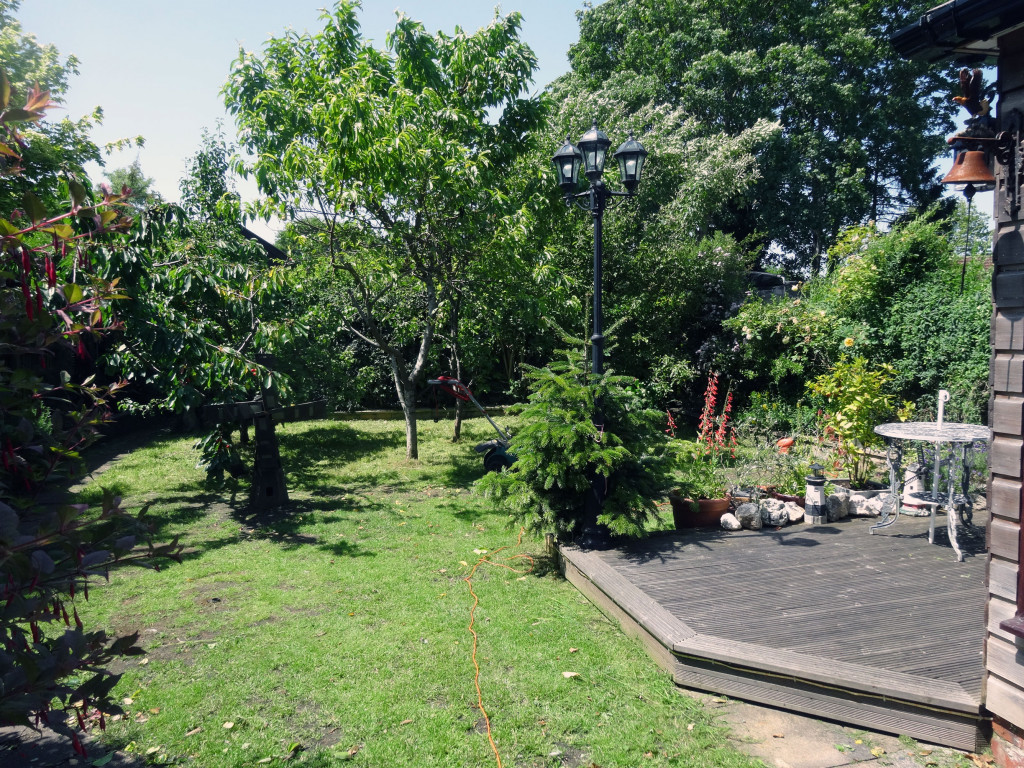
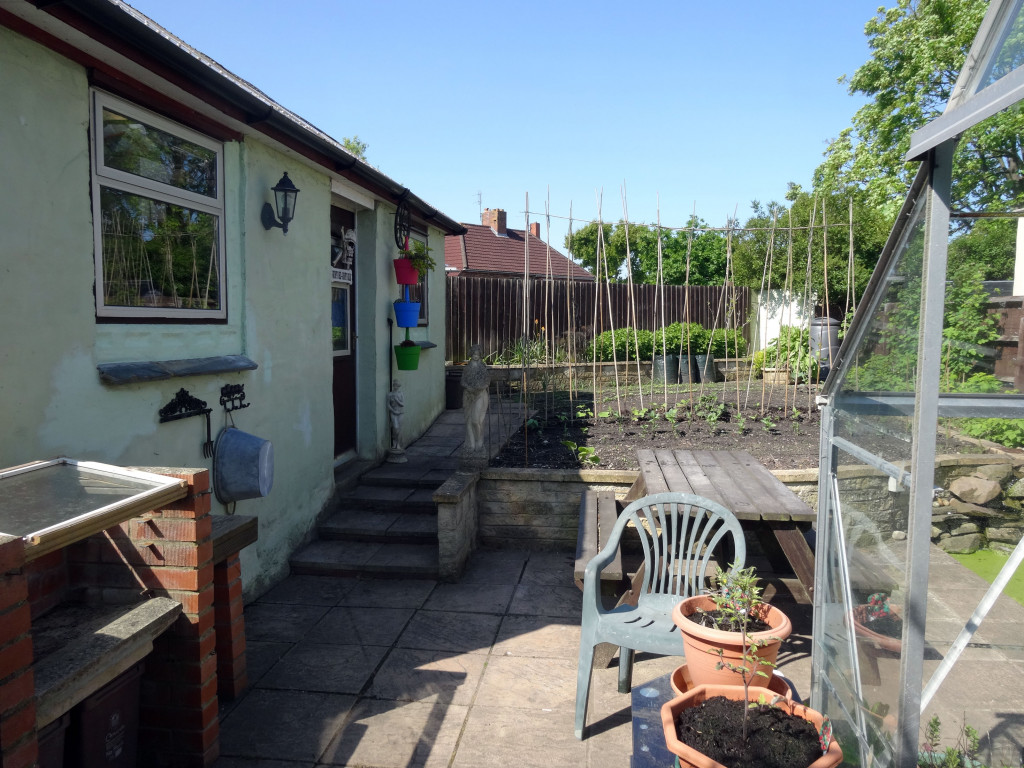
I can see you and most likely your wife put tons of work into your garden. You created a beautiful peaceful space. Let me share a few pic's of my Garden.

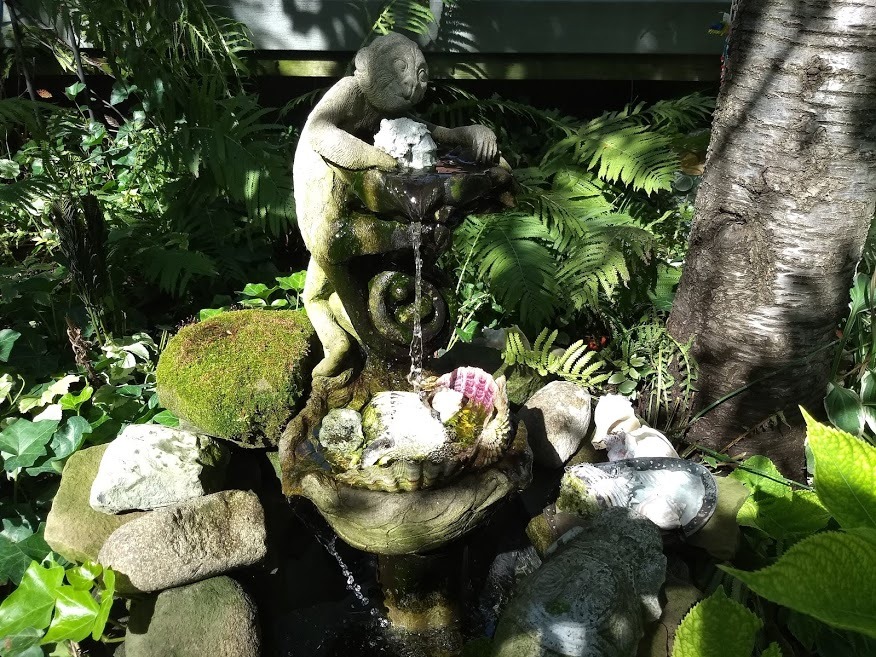


Positively stunning garden photos, Arthur, who is it with the "green thumb" you or your wife?
Wow brilliant images of your garden too; I love the soft landscaping in your garden, an attention to detail.
It’s mainly me that does most of the gardening, and I tend to focus mostly on the fruit and veg; apart from potatoes I grow enough veg in our back garden to feed the family for 12 months of the year, saving my wife $10 a week on the food bill.
Although while our son was at university, before becoming a professional photographer, he used to work part time at a local garden centre, and learnt all the Latin words for all the plants in the garden, and he used to enjoy helping me in the garden. But these days he’s far too busy running his business.
A few more photos below:-
1st Image: Archway between the two garden rooms (lawn/mini orchard & veg plot).
2nd Image: A little nook on the other side of the archway, next to my wife's food store shed, where family and friends like to congregate when we have a garden party; in the image my wife and son with our friend from Portsmouth during a BBQ one summer.
3rd Image: the greenhouse (next to our wildlife pond) that my wife bought as a birthday present for me shortly after we re-landscaped that part of the garden; used to bring on seedlings in the spring for planting out in the summer, and for growing our tomatoes and marrows.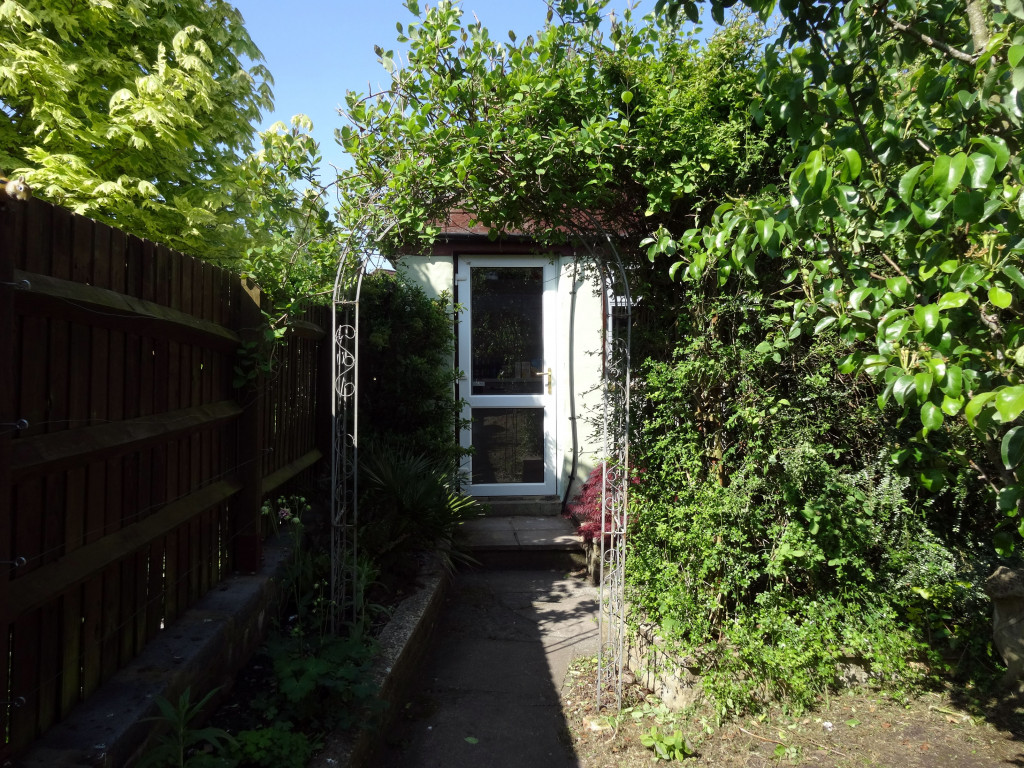
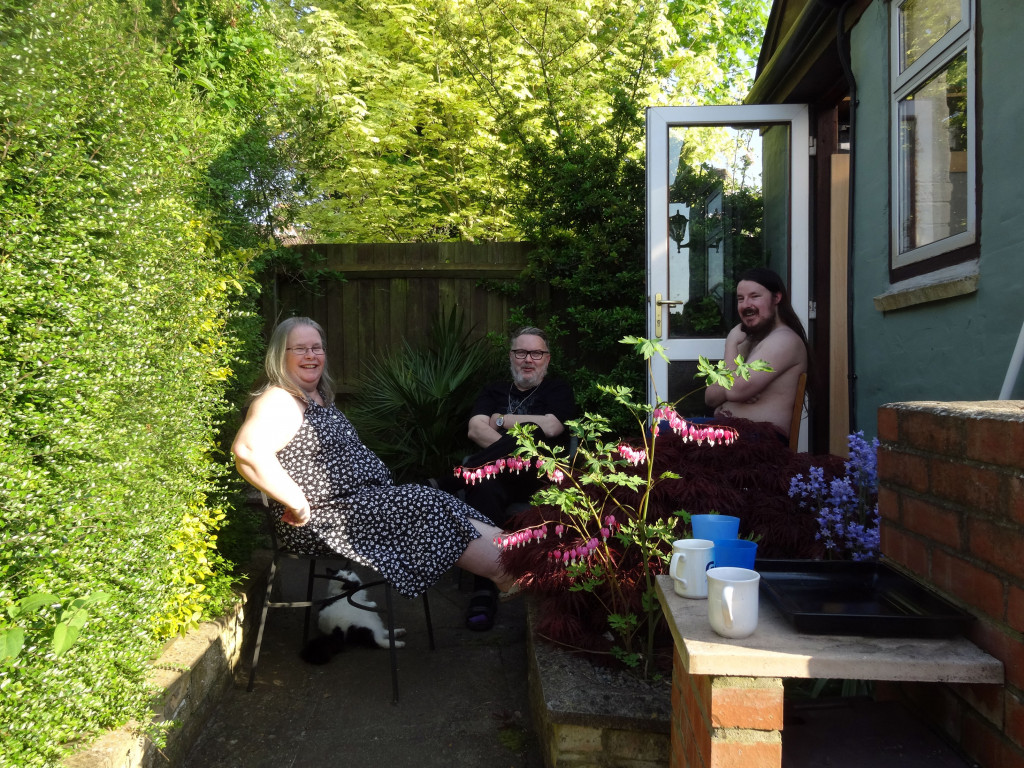

Wonderful spaces to chill out, so very English... I am jealous... I have always wanted a greenhouse, but with the very cold Michigan weather, they don't do the job. I would love to be able to grow some veggtables, but it would seem my flower gardens have won out. I do have a bit of a herb garden, that does well, and saves money on herbs all summer. I must share my chill space and as you see fun space.
I always look forward to spring, to get back out and bring my gardens back to life.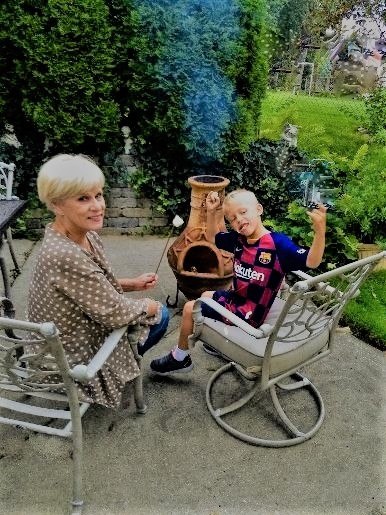
I know what you mean about the weather, I too can’t wait until spring, when I can get back out into our garden and prepare it for the summer crops. At the moment it’s just 8C (46f), with plenty of rain and clouds, and not a great deal of sun (so a bit chilly).
Likewise, I’ve got an herb wheel and mint garden, and other herb plants dotted around the garden including a bay tree.
Your ‘chill space’ looks real cool, nicely landscaped.
We do have decking leading off from the conservatory, but our main ‘chill space’ is on the patio at the bottom of the garden, by the wildlife pond.
A few photos of the last BBQ we had one May, on the main patio by the wildlife pond (before the pandemic) and from the clock on the outside wall of the garden shed you can see the time the photos were taken is 8:20pm.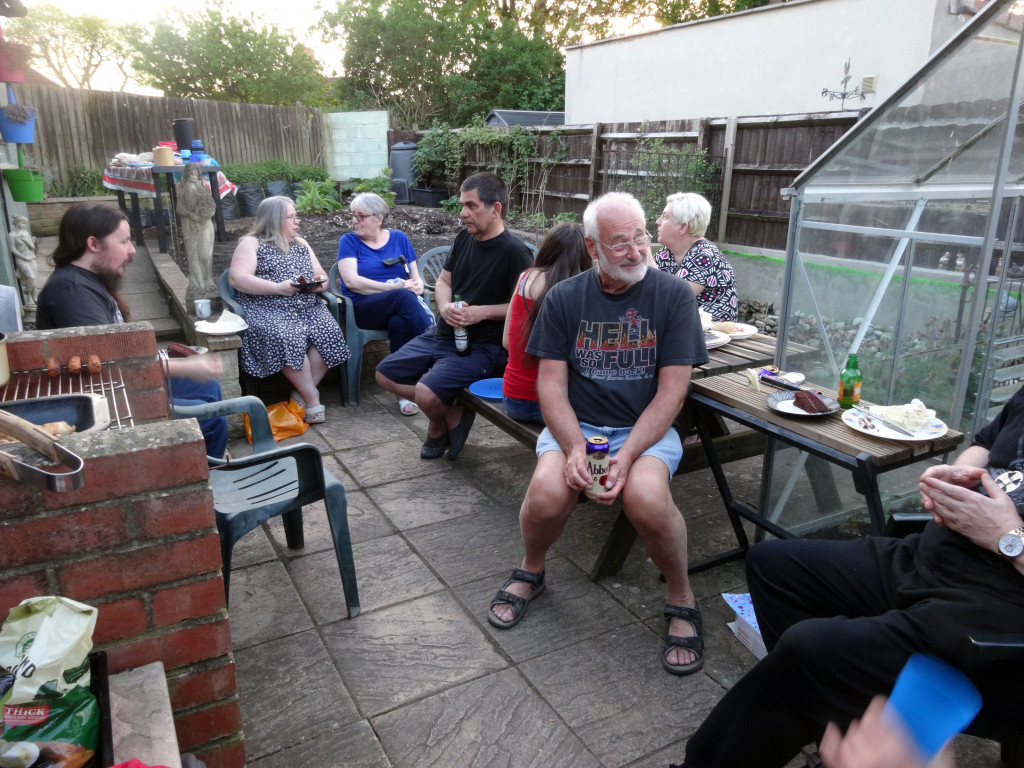
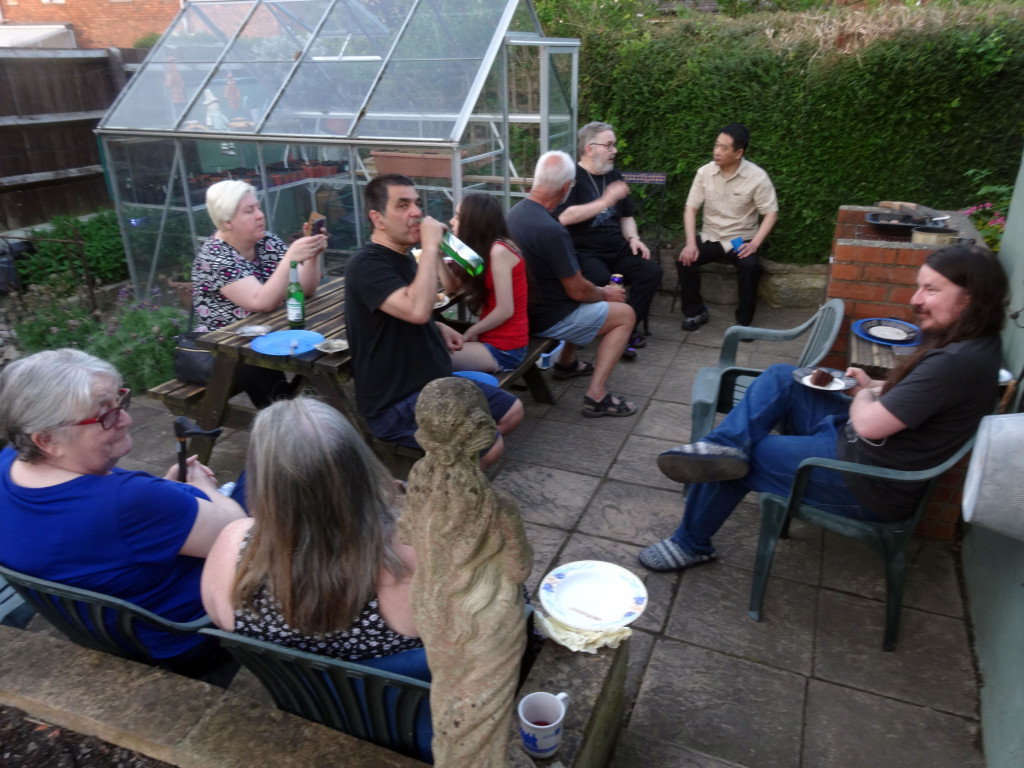
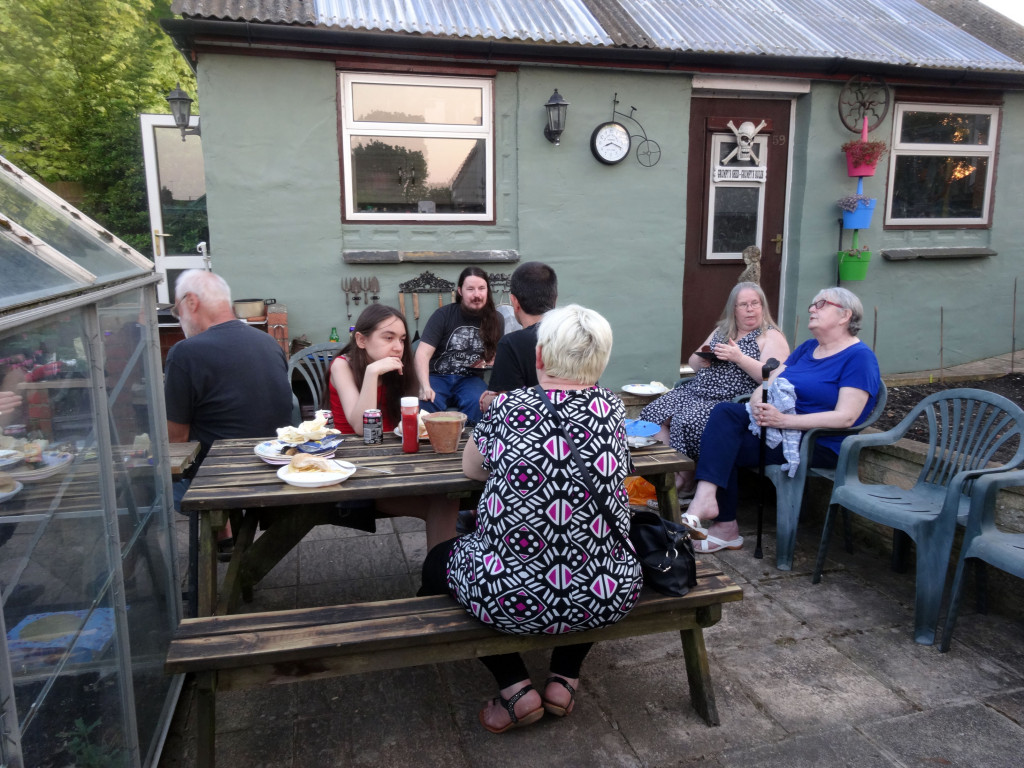
Nice photo of you and the youngster, Sharlee. I see that you have your own "Garden of Eden"....
Thank you -- That is my grandson, the true little love of my life. My son at 45 and his lovely wife decided to have a son! Our other grandchildren are in their mid-twenties, so this fellow was like a do-over as far as grandchildren go.
He is my bud... we get in lots of trouble together. LOL
As Credence says, you do have your own ‘Garden of Eden’ and a lovely family to share it with; you’re certainly having fun with your grandson in the photo, I assume that’s a marshmallow that you have in your hand.
Searching back I found the detailed survey of public opinion in Bristol taken just after the Edward Colston statue was toppled; and the survey does reflect what type of people Bristolians are e.g. Bristol is a Labour (Socialist) stronghold in both local and national elections.
The result of the Bristol survey taken just after the statue was toppled is as follows:-
• 53% of Bristolians think that everything named after Colston and other slave traders in Bristol should be renamed.
• 18% of Bristolians think that some of the places bearing his name, but not all, should be renamed.
• 29% of Bristolians think that nothing should be renamed.
• 61% of Bristolians said the protesters were right to pull down the statue.
• 56% of Bristolians feel that throwing the statue in the water was the right thing to do.
• 60% of Bristolians feel that it was not right that Bristol had the statue in the first place, because of Colston's links to the slave trade.
• 27% of Bristolians feel the statue had its place, as it was possible to acknowledge his contribution to the city while condemning his links to the slave trade.
• 12% of Bristolians feel that Colston was an important part of the city's history and that he deserved a statue.
• 3% of Bristolians feel that Colston was not important enough to have a statue.
• 57% of Bristolians feel that they did not think those responsible for toppling the statue should face criminal charges.Christopher Columbus was my favorite hero in history class. later on in life, I built a sunken treasure museum featuring Columbus as a the first European pirate in North America. Wow, a whole opposite Columbus went from ultimate hero to greatest villan. He was first European to destory these natives in salvery, genocide and gold rush by stealing their gold from their teeth.
I found out all this knowledge by the freedom of speech and freedom of expression, good or bad. I say, Satues, not to be destroyed yet can be moved to another location, possibly with limitations. We know the winners who won, were the ones who wrote the history books and expression. We won't be able to examine all the facts and evidence when we destory what was expressed.
The KKK Express their crap out in the open in public. Where are they today, they are just bad mouthing blacks and Jews, wail high on pot.
Pot is great for PTSD
We need more free speech and expression, not less.We seem to be on the same page for once; which makes a nice change!
Public opinion in Bristol is as you say “the statue should not be destroyed but moved to another location” e.g. Most Bristolians are in favour of the Colston statue being relocated to a local museum where the ‘full narrative’ can be given – That being the benefits that he did for Bristol, such as paying for schools, hospitals and homes for the poor (Alms Houses) and how he earnt that wealth (from the slave trade) to pay for his generosity.
Currently the Colston statue is on public display in the ‘M Shed Museum’ waiting its final fate. The M Shed was an Edwardian warehouse, built on the quay of Bristol docks at the turn of the 20th century at a time when the docks was a commercial sea port. The Bristol Docks ceased operating in 1973 and was transformed into a leisure centre and tourist attraction and the warehouse known as ‘M’ shed transformed into a museum.
After the statue was recovered from the harbour (the old docks) where the protesters had dumped it, professional restorers stabilised the spray paint (graffiti) put on the statue during the protest (so that the graffiti is not lost to history), and have for now decided not to repair the damage to the statue; as the damage done to the statue is seen by the authorities as ‘part of the history’ of the statues history. And the statue is currently placed horizontal (in its fallen position) with a plaque next to the statue acknowledging the 2020 protests.
The statue will remain in the ‘M’ shed museum until the future of the statue is decided. Currently there’s a consultation period, whereby the Local Government is seeking the views of the Bristol people on what should happen to the statue; a decision (based on public opinion) is due to be made in 2022. So the future fate of the statue is in the hands of the Bristol people themselves.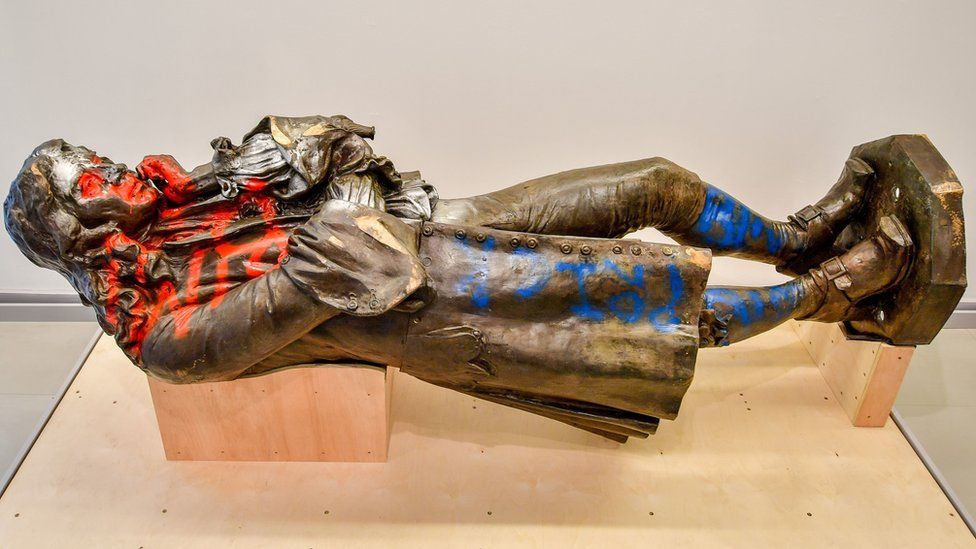
In reference to your mention of Christopher Columbus, Bristol’s hero is John Cabot (1450 to 1500).
John Cabot sailed in his ship, the Matthew, from Bristol in 1497 to discover Newfoundland in Canada.
In his honour Bristol built:-
(i). ‘Cabot Tower’ in the 1890s, the tower is located just off the city centre and overlooks the city; and
(ii). Cabot Circus, a large shopping complex just off the city centre, built in 2008.
John Cabot Tower, Bristol: https://youtu.be/JLlXNMqU4Ck
And in 1994 a full size replica of the Matthew was built in Bristol, and it can often be seen moored in Bristol Docks (Harbour) just off the city centre, as a tourist attraction. And in 1997 the replica of the Matthew sailed from Bristol to port Bonavista, Newfoundland, Canada, as a 500th anniversary of the original voyage.
The Boats That Built Britain - The Matthew: https://youtu.be/-6TikIvFmeo
Edward Colston statue graffiti will be preserved:-
https://www.bbc.co.uk/news/uk-england-bristol-53083939
Following the retrieval of the statue from the Bristol harbourside, Fran Coles, the city council's (local government) conservation and documentations manager (pictured below), said "Our main concern is making sure that we can conserve the paint, the graffiti that's on him now…”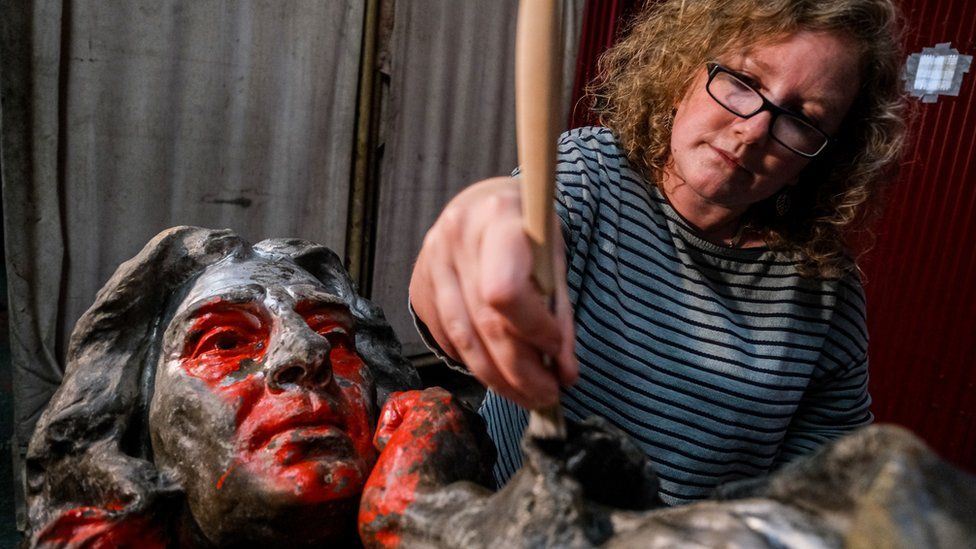
I think that is a good idea for history's sake. It will show not only a history of what many felt about Edward Colston. But it will give way to proof of what society did in regards to taking it down unlawfully. The incident could speak loudly, and over time may fit into a scenario of events that led into the future societal norms.
Some one just emailed me this, which makes for interesting reading e.g. a legal assessment under Bristol Law of the Court Case of the Bristol 4 who toppled the Colston Statue:-
The article below is written by a British Barrister and is entitled:-
Do the verdicts in the trial of the Colston 4 signal something wrong with our jury system? 10 things you should know:-
https://thesecretbarrister.com/2022/01/ … PGHeSZYudQI'll keep my thoughts about this issue to myself because one of the contributors very neatly summarized my point of view.
I would just like to say that I greatly admire the thought and work that has gone into this thread.
Also - congratulations to all participants who, regardless of differences of opinion, conducted the discussion in a thoroughly civilized manner. Well done.Yes, it is... Living in Michigan winters can be long and gray, but we do get our days when the sun hits the snow and brightens the day. Plus, I am a snowbird, and next week will be headed south of the border for the remainder of the winter. A wonderful perk of being retired.
Yes, I'm looking forward to the spring and summer too. when I can get back out into the garden again.
Enjoy yourself. I don't think I'll ever be able to retire!
"New World Order" - Tom MacDonald & Adam Calhoun
https://www.youtube.com/watch?v=SO-yVHaAlyA
Some people feel like thisIn watching an American TV Series last week I was gobsmacked to see both the Defence and Prosecution questioning jurors one by one and accepting or dismissing them, dependent on their answers and attitude etc.
Is this normal in the American Justice System?
In the UK jurors at picked at random by the court and neither the Prosecution nor Defence has any say in the selection – which to me, as a Brit, seems fairer!Yes, that is the way it is done. However, it can vary by each state how many challenges a lawyer may make. To me that is more fair as it can eliminate prejudicial prospects. Think racist and stuff like that. Jurors for both civil and criminal are twelve, but criminal needs to be unanimous for conviction while civil nine or more to favor. A determining factor is reasonable doubt with deciding to convict or not.
For Jury trials in California peek at link below. Scroll to #2 a short hop where it explains Jury Selection.
https://www.shouselaw.com/ca/defense/pr … ury-trial/
Just for your interest here there is a popular TV show, 'Bull', about a psychologist who has a business based on trial psychology for picking juries to win a case. I watch it as it is interesting and has good plots. They do lose sometimes. So, that to me opens the mind to what can or does happen in the world of law and trials.
Here is a 5min vid introducing the series explaining his concept of jury selection.
https://www.youtube.com/watch?v=cmHeKAF6vwIWow, what a difference in systems: the ‘Bull’ clip is interesting video, giving some insight into the American system. Very defiantly alien to what I’m familiar with!
In Britain:-
• We only have Jurors for serious criminal cases e.g. where any potential prison sentence could be six months or more.
• Minor Criminal cases where the prison sentence can’t be more than six months are dealt with by Magistrates.
• Also we don’t have a jury for civil cases; they are decided by a judge or a panel of judges.
In a Magistrate court the decision is made by three Magistrates on a majority decision bases.
Magistrates do not have any legal qualifications and are unpaid.
The Magistrates' Court in Britain: https://youtu.be/WeNDacwO5NA
In a criminal court with jury, it’s at the discussion of the judge as to whether the verdict has to be unanimous or a qualified majority e.g. when I did jury service, on one of the cases I sat the judge at first asked for a unanimous decision, but after 90 minutes, with no decision from the jury, the judge called us all back into the court room and said that he would be content with a majority verdict of 10 to 2. So we went back to the jury room, and after another 90 minutes of debate actually ended up with a unanimous verdict of ‘not guilty’.
Selecting the jury in America must be quite time consuming. When I was on jury service, within less than 30 minutes of the jury being randomly selected by the court for a particular case we would be in the court room waiting for the judge to walk in.
Also, in the British system, solicitors/lawyers are not allowed to conduct their case in a Criminal Court, it has to be done by a Barrister, who is often picked at random (usually by the court) that morning; but they are so good at their job that they need little preparation to know what they are doing.Yes, it appears they are different. First, a jury trial is guaranteed in our Constitution through the 6th Amendment. It reads as follows:
Amendment VI
In all criminal prosecutions, the accused shall enjoy the right to a speedy and public trial, by an impartial jury of the state and district wherein the crime shall have been committed, which district shall have been previously ascertained by law, and to be informed of the nature and cause of the accusation; to be confronted with the witnesses against him; to have compulsory process for obtaining witnesses in his favor, and to have the assistance of counsel for his defense.
We have the Miranda Warning read when one is arrested saying:
“You have the right to remain silent. Anything you say can and will be used against you in a court of law. You have the right to an attorney. If you cannot afford an attorney, one will be provided for you. Do you understand the rights I have just read to you? With these rights in mind, do you wish to speak to me?”
If it is not read to them at the time of arrest the prosecuting attorney cannot use what was said in the trial. Info on Miranda Warning below:
https://www.nolo.com/legal-encyclopedia … 29930.html
The attorney profession is big business no matter what trial type - civil or criminal. An average earning for a civil attorney is $75,000/yr (55,145 pound) and criminal is $95,000/yr (69,851 pounds) It is very common to see injury lawyers advertising on TV as well as class action law suits against pharma companies.Solicitors don’t advertise on TV in the UK.
The salary for a solicitor (Lawyer) in the UK dependent on length of experience, qualifications and type of practice etc. in the UK ranges from £27,000 ($36,618) per year for a newly qualified solicitor to over £100,000 ($135,625) if you become a partner in a business rather than just an employee.
A Barrister in the UK, again dependent on length of experience, qualifications and type of practice etc. ranges from £16,633 ($22,558) per year (for those in their final stage qualification for the Bar); to over £1 million ($1.36 million) after 10 years of experience if you are self-employed (as 80% of Barristers are); a Barrister as an employee can expect to earn between £25,000 ($33,900) and £100,000 ($135,624) per year.
There are some similarity between your ‘Amendment VI’ and the UK wording for ‘trial by jury’; but differences as well:-
The bases for ‘trial by jury’ in the UK are imbedded in the Magna Carta of 1215, which reads:-
“No free man shall be captured or imprisoned or disseised of his freehold or of his liberties, or of his free customs, or be outlawed or exiled or in any way destroyed, nor will we proceed against him by force or proceed against him by arms, but by the lawful judgment of his peers or by the law of the land.”
This was reinforced in Legislation passed by the UK Parliament on the 5th July 1641, which reads:-
“WHEREAS by the great charter many times confirmed in parliament, it is enacted, That no freeman shall be taken or imprisoned, or disseised of his freehold or liberties, or free customs, or be outlawed or exiled or otherwise destroyed, and that the King will not pass upon him, or condemn him; but by lawful judgment of his peers, or by the law of the land ...”
The wording of a Police caution in the UK is, but also with some difference, and likewise if it’s not said at the right time, using the right words, it makes the arrest and charges void. The wording the police have to use in the UK are:-
“You do not have to say anything. But, it may harm your defence if you do not mention when questioned something which you later rely on in court. Anything you do say may be given in evidence”.
I think the main difference here is that we do NOT have the ‘right of silence’ to the same degree that you have in the USA.Yes, pretty much similar while I think the aim is pretty much the same. Regard the silence part to emphasize that I watch a TV program, The First 48 Hours, a crime documentary series showing real detectives investigating homicides in various cities. The title says it all the aim is to solve the crime in the first 48 hours when it is most critical.
Back on point, during the many interviews they show with suspects when doing the lead suspect mainly trying to get a confession as soon as the suspect says I want a lawyer the interview stops dead in its tracks. Usually they will arrest that suspect and charge him, yet not always.
A peek at a wiki article on the show
https://en.wikipedia.org/wiki/The_First_48
Just for giggles I peeked and it seems the highest paid lawyers are medical lawyers according to one article while another says it is patent lawyers.Taking your last point first e.g. medical claims – I don’t think it would be a lucrative business for solicitors (lawyers) in the UK in that I don’t think (from the impression I get) that the pay-outs are as high, and that there are as many just cases; although I haven’t crossed checked any data so I could be wrong?
Anyway, in the UK the average settlement is £50,000 ($67,800) and in 2018 the NHS paid out £2.36 billion ($3.2 billion) in negligence claims. I’d be interested if you have any comparable data for the USA.
THE FIRST 48 HOURS
I thought I recognised the title, and when I checked, it’s played on Channel 4 in the UK. It’s not a series I’ve watched (I prefer the Murdoch Mysteries) but I have caught glimpses of it in the past.
But one thing of interest I did note when I viewed the Wikipedia link you gave me on the TV Series it that although it’s an American production, it’s actually made by ITV Studios (A British multinational TV production and distribution company).
ITV Studios parent company is ITV plc; which in my view has an interesting history:-
The BBC, by Royal Charter, was set up by the UK Government, as a Government Corporation, and started broadcasting on TV in 1932.
The BBC (known as Channel 1) is a single entity, but in 1955 the UK Government tendered for licences on a Regional basis for private TV broadcasters to go into completion with the BBC; the concept being that healthy competition would improve the quality of production.
So from 1955 we had around 15 Independent Regional TV Broadcasters (known as Channel 3) competing with the Nationwide BBC.
In 1964 the UK Government created BBC2 (known as Channel 2), as an alternative to BBC e.g. to focus on the fine arts and education etc.
Almost from their creation back in 1955 the 15 Independent Regional Channels, to cut costs shared material with each other e.g. when one of the Regional TV channels created a good production that was popular it would share it with the other Regional Channels.
For example, Coronation Street (a soap about ordinary life of ordinary working class people in the Midlands) was created by Granada TV in Manchester in 1960, and proved so popular that it’s been played across all ITV networks across the country 5 days a week (Mon to Fri) at prime time since 1960 to this present day; 10,561 episodes to date.
Coronation Street isn’t my ‘cup of tea’ but it’s one of the most popular programmes on British TV:-
Coronation Street - Rovers Return Fire Part 1: https://youtu.be/i0DRn9Ah6H4
In 1993 the UK Government relaxed the licencing rules, which allowed the 15 Independent Regional Channels to merge together, to form a single Company (economies of scale), known as ITV (Independent Television).
In 1982 the UK Government created Channel 4 (as another Government Body), with specific restrictions and requirements in its Charter e.g. Channel 4 is not allowed to make its own programmes, it has to pay for other productions, such as “The Frist 48 Hours” produced by ITV Studios in the USA; and commission work from the arts and media industry in Britain to encourage investments in areas that normally struggle to get funding and recognition. Although Government owned, Channel 4 is a maverick Channel that isn’t afraid of controversy e.g. making documentaries that’s critical of corporations and Government!
Finally, in 1997 the UK Government launched Channel 5; another Private TV Channel to compete with the BBC & ITV.
Then from around 2000 Sky and Cable TV took off, and now we have multitude of TV Channels at our fingertips, including the original 5.Wow! I didn't realize the BBC was a government created channel or the offshoots. The closest we have to a government channel is the Public Broadcasting Service (PBS). It does receive government funding, though its main funding is public contributions. There is also NPR - National Public Radio. I watch the local PBS as they have a lot of good history shows. I would like to listen to NPR as they have a lot of political / governing shows that are neutral in perspective goes into depth.
Other than PBS all local channels, network channels, cable networks, and streaming are private enterprise. The Federal Communications Commission (FCC) is a government agency overseen by Congress that regulate those. There mission is:
The Federal Communications Commission regulates interstate and international communications by radio, television, wire, satellite, and cable in all 50 states, the District of Columbia and U.S. territories. An independent U.S. government agency overseen by Congress, the Commission is the federal agency responsible for implementing and enforcing America’s communications law and regulations.
The FCC about landing page with links to their topics
https://www.fcc.gov/about/overview
Note the FCC does not regulate or oversee video streaming services. The Federal Trade Commission (FTC) does a little bit mainly with data collection and advertising .
Here is info on Public Broadcasting
https://en.wikipedia.org/wiki/Public_br … ted_States
FTC Issues Orders to Nine Social Media and Video Streaming Services Seeking Data About How They Collect, Use, and Present Information
https://www.ftc.gov/news-events/press-r … g-services
As far as some info on medical stuff a 2010 study states medical liability cost 55.6 billion annually or 2.4% of total health care spending. Consider in the U.S. for the year 2018 3.7 trillion dollars were spent on all of health care or 18% of GDP.
It is common to see on TV lawyers advertising for people who suffered symptoms of a medicine to contact them to see if they qualify to receive anything from the pool the court made the pharma company pay. One that is big now in the news is the pharma companies that made and distributed OxyContin or similar opioid products that were prescribed for pain. Addiction to it is said to be epidemic.
A brief explainer by the American Bar Association
https://www.americanbar.org/news/abanew … ntroversy/Thanks for your feedback, and all the links, very educational reading.
Yeah, the first five TV Channels (BBC1, BBC2, ITV, C4 & C5) were all created by the government (with the BBC & C4) being Public Corporations (government bodies) and ITV & C5 being private companies.
The BBC and C4 being public corporations each have a ‘Charter’ with the Government; the BBC Royal Charter being 67 pages long and stipulates format, the level of risk productions, and genre mix etc. that’s required of the BBC.
ITV & C5 being private companies have franchises (under licence) with the Government to operate; and ITV’s franchise is almost a carbon copy of the BBC’s Royal Charter.
All other TV and Radio stations that have come on air since the original five only need a licence from the government to broadcast, so they have a lot more latitude in format and genre etc.
However, all TV & Radio broadcasters (regardless to who they are) who broadcast in the UK have to comply with the Regulation as laid down by Ofcom. Ofcom is an independent government approved regulatory authority; funded by the media industry itself, and not by government.
What does Ofcom do? https://youtu.be/cdVUr-NrXng
As regards funding:-
The BBC is funded by the Government via the TV licence (so no adverts on BBC) e.g. every household in the UK that has a TV have to by a TV licence to pay for the BBC, even if they don’t watch any of the BBC channels themselves. How much the TV licence costs is set by the UK Government annually, currently set at £159 per year £159 $215).
C4 (Channel 4) although another government corporation, gets its funding through advertising, just like the private TV companies.
ADVERTISING
• In the UK Ofcom has limited the amount of Adverts allowed on TV to an average of 7 minutes per hour.
• Political adverting is banned in the UK; instead each political party is given a ‘free’ Party Political Broadcast slot at the time of an election.
• Product Placement is banned on British TV, and
• And for any programme which is ‘sponsored’ the sponsor is prohibited on mentioning or plugging themselves within the programme; all they are allowed to do is to briefly say, just before the programme is about start “This programme is sponsored by (sponsors name)”.
Also, in the UK all Advertising has to be ‘Honest, Descent, and not misleading’; and the rules on advertising are strictly enforced by the ASA (Advertising Standards Authority). The ASA is not a government body; it’s a ‘self-regulatory’ set up by the Advertising Industry itself in 1961, and financed by the Advertising Industry. Therefore the ASA has only limited legal powers of enforcement, but it has a close working relationship with government bodies that can take legal action, such as the ‘Office of Fair Trading’ and Ofcom.
Advertising Standards Authority: Every UK ad a responsible ad: https://youtu.be/0xjTJoLklvs
With Regards to Health:-
The NHS with around 1.3 million employees is the 8th largest employer in the world. In 2018 the NHS budget was £153 billion ($207 billion), which was 7.2% of the UK’s GDP.
OPIOID OVERDOSE
I haven’t considered it as a big issue over here, but your last link made some interesting reading e.g. 115 people die every day in the USA from opioid overdose. I had a look at the data for England and Wales (link below) where in 2020 there was 2,263 deaths related of opiates.
A quick calculation, taking population size into account, would suggest there’s over twice the number of opiate related deaths in the USA than the UK!
https://www.ons.gov.uk/peoplepopulation … wales/2020I found a copy of the BBC’s current Royal Charter (41 pages) valid until 2027; and which makes for an interesting browse, scan through - albeit not something you’ll want to read from start to finish.
The Title Page Reads:-
BROADCASTING
Copy of Royal Charter for the continuance of the British Broadcasting Corporation
Presented to Parliament by the Secretary of State for Culture, Media and Sport by Command of Her Majesty December 2016
The Mission Statement in the Royal Charter for the BBC reads:-
The Mission of the BBC is to act in the public interest, serving all audiences through the provision of impartial, high-quality and distinctive output and services which inform, educate and entertain.
http://downloads.bbc.co.uk/bbctrust/ass … harter.pdf
And the 1st proper page in the Royal Charter, after the title page uses rather quaint language, and reads:-
ROYAL CHARTER FOR THE CONTINUANCE OF
THE BRITISH BROADCASTING CORPORATION
ELIZABETH THE SECOND by the Grace of God of the United Kingdom of Great Britain and Northern Ireland and of Our other Realms and Territories Queen, Head of the Commonwealth, Defender of the Faith:
TO ALL TO WHOM THESE PRESENTS SHALL COME, GREETING!
WHEREAS on the 20th December 1926 by Letters made Patent under the Great Seal, Our Royal Predecessor His Majesty King George the Fifth granted to the British Broadcasting Corporation (“the BBC”) a Charter of Incorporation:The mission statement is what I like. I call it the KISS principle. Some say that is Keep it Simple Stupid and used in humor. I say it means Keep it Simple and Succinct using Occam's Razor as a guide. The BBC's mission statement in my view fulfills that nicely.
I will have to poke about and look more into the BBC programming to feed my curiosity. After a peek on the web I see here you can watch BBC American on some streaming services. Unfortunately they cost as they are a subscription services and on a fixed income my budget does not allow for it. Who knows maybe I will win the lottery ha-haI never thought of it that way, but yes, KISS is rather apt for the BBC ‘mission statement’.
Someone has put together a comprehensive list of most of the BBC productions ‘past and present’ on Wikipedia; with links for most listed to other Wikipedia articles dedicated to each production!
https://en.wikipedia.org/wiki/List_of_t … by_the_BBC
One of my favourite all time BBC productions from my childhood, and which is still produced today, is ‘Doctor Who’.
And of course I like all the old classic BBC comedies of decades past, including Dad’s Army, which isn’t listed on the above Wikipedia list (showing that the list is not complete); and from more contemporary productions by the BBC some of my favourites include Series like ‘Coupling’ and ‘The Worst Week of My Life’.
• https://en.wikipedia.org/wiki/Coupling_(British_TV_series)
• https://en.wikipedia.org/wiki/The_Worst_Week_of_My_Life
Related Discussions
- 30
Florida sheriff says he may deputize gun owners against protesters
by Readmikenow 5 years ago
Clay County Sheriff Darryl Daniels, no stranger to making viral videos appealing to tough-on-crime politics, released a video Tuesday that said he will make “special deputies of every lawful gun owner in this county” if he feels the county is overwhelmed by protesters.The three-minute video shows...
- 23
Silver Spoons vs Plain Forks
by Kathryn L Hill 9 years ago
Plain Old Forks want what the Shiny Silver Spoons have. Those forks see they will never be able to scoop up whatever they please like the silver spoons do. "Its not fair!" they proclaim. "Where is the equality? Where is the justice? I want delicious mouthfuls too!" So, they...
- 46
Antifa now protesting Biden
by Readmikenow 4 years ago
I thought Antifa hated President Donld Trump. Seems they don't like Biden either.“WHAT HAPPENED?Violent protesters, who were reportedly associated with Antifa, marched down the streets of Portland’s Pearl District smashing cars and vandalizing businesses.WHY WERE THEY PROTESTING?The...
- 50
Are We a Nation of Laws or Not?
by Dan Harmon 3 years ago
On the news tonight were pictures of "protests" outside the homes of 6 (only 6) of the nine Supreme Court Justices. I had heard that was happening but had not seen confirmation of more than a handful of people.This is very much against federal law; protests attempting to intimidate...
- 44
Guiliani either has a big mouth or the goal is GOP nominee 2016
by Credence2 11 years ago
As my stomach turn listening to former NY Mayor, Guiliani blame the President and the current mayor for the deaths of the 2 officers in Bed-Sty, New York City, I had reason to pause. I think for myself and the insinuation that all the people involved in PEACEFUL protests were incited beyond reason...
- 10
Do you think the London riots are about the shooting by the police or is there m
by Crime Shield 11 years ago
Do you think the London riots are about the shooting by the police or is there more to it?
















